

THE MESSENGER



THE MESSENGER
Subscription Price $1.50 Per Annum
Entered at the Post Office at University of Richmond, Va., as second-class matter.
OCTOBER, 1921 No.
I
Richmond College Department
R. T. MARSH, JR., '22 ________________________________Editor-in-Chief
A. B. CLARKE, '23____________________________________Assistant Editor
0. L. HITE, '22- ___________________________________Business Manager
L. W. WHITEHURST ____________________Assistant Business Manager
C. W. NEWTON ______________________________________Exchange Editor
ASSOCIATE EDITORS
Mu Sigma Rho
R. E. GARST B. U. DAVENPORT
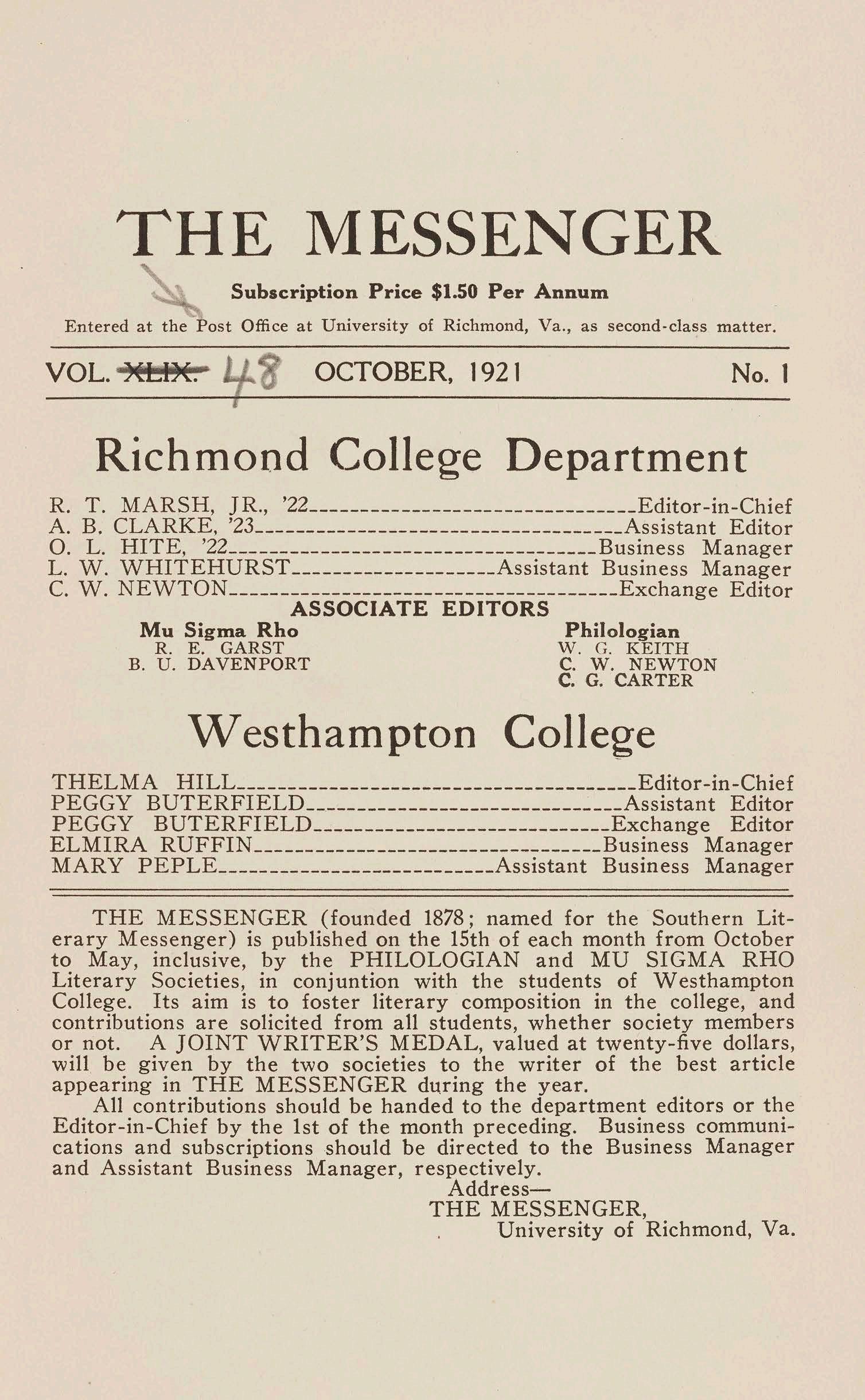
Philologian
W. G. KEITH C. W. NEWTON C. G. CARTER
Westhampton College
THELMA HILL_ ______________________________________Editor-in-Chief
PEGGY BUTERFIELD _______________________________Assistant Editor
PEGGY BUTERFIELD _____________________________Exchange Editor
ELMIRA RUFFIN __________________________________Business Manager
MARY PEPLE ___________________________Assistant Business Manager
THE MESSENGER (founded 1878; named for the Southern Literary Messenger) is published on the 15th of each month from October to May, inclusive, by the PHILOLOGIAN and MU SIGMA RHO Literary Societies, in conjuntion with the students of Westhampton College. Its aim is to foster literary composition in the college, and contributions are solicited from all students, whether society members or not. A JOINT WRITER'S MEDAL, valued at twenty-five dollars, will be given by the two societies to the writer of the best article appearing in THE MESSENGER during the year. All contributions should be handed to the department editors or the Editor-in-Chief by the 1st of the month preceding. Business communications and subscriptions should be directed to the Business Manager and Assistant Business Manager, respectively.
Address-
THE MESSENGER, University of Richmond, Va.


Cfbitorial
One look upon the campus is indeed challenging. The campus is fairly teeming with students everywhere. Turn wheresoever you may and 'ere long students will be seen headed for this or that point; for the Is the class room, student shop, Cafeteria and stop Messenger thirty.
Important? It is well to remember that our impressions count significantly. They come directly and indirectly, not with a precipitate rush, unbalancing the mental faculties, but, entering silently and sometimes slowly, they permit the mind to retain the quiet, normal, working state.
However, without going into the actual process of sense impression it may be readily agreed that we all are keenly impressed sometime in life. The manner in which we are impressed varies, but after all, when the truth has been taken in and stamped upon the memory 3 much has been accomplished. So now heed the plea for a fa vorable impression of the Messenger.
On the Freshman Registration Day, this question, which is the topic of this editorial was asked, "Is the Messenger important?" Naturally a Freshman whose pre-arranged and carefully worked out budget of e:x,penditions seems very large could rightly ask this question. In turn I want to submit it to all readers and ask them to consider the importance of the publication.
Replying to this interrogation, it can be said, first, that the Messenger is the University of Richmond's literary publication. Even though most of us are familiar with this fact it is well to reiterate and to emphasize the two words Literary Publication , because they are of much significance.
Generally it is implied that literary composition is worth while, without reference to the literature border-
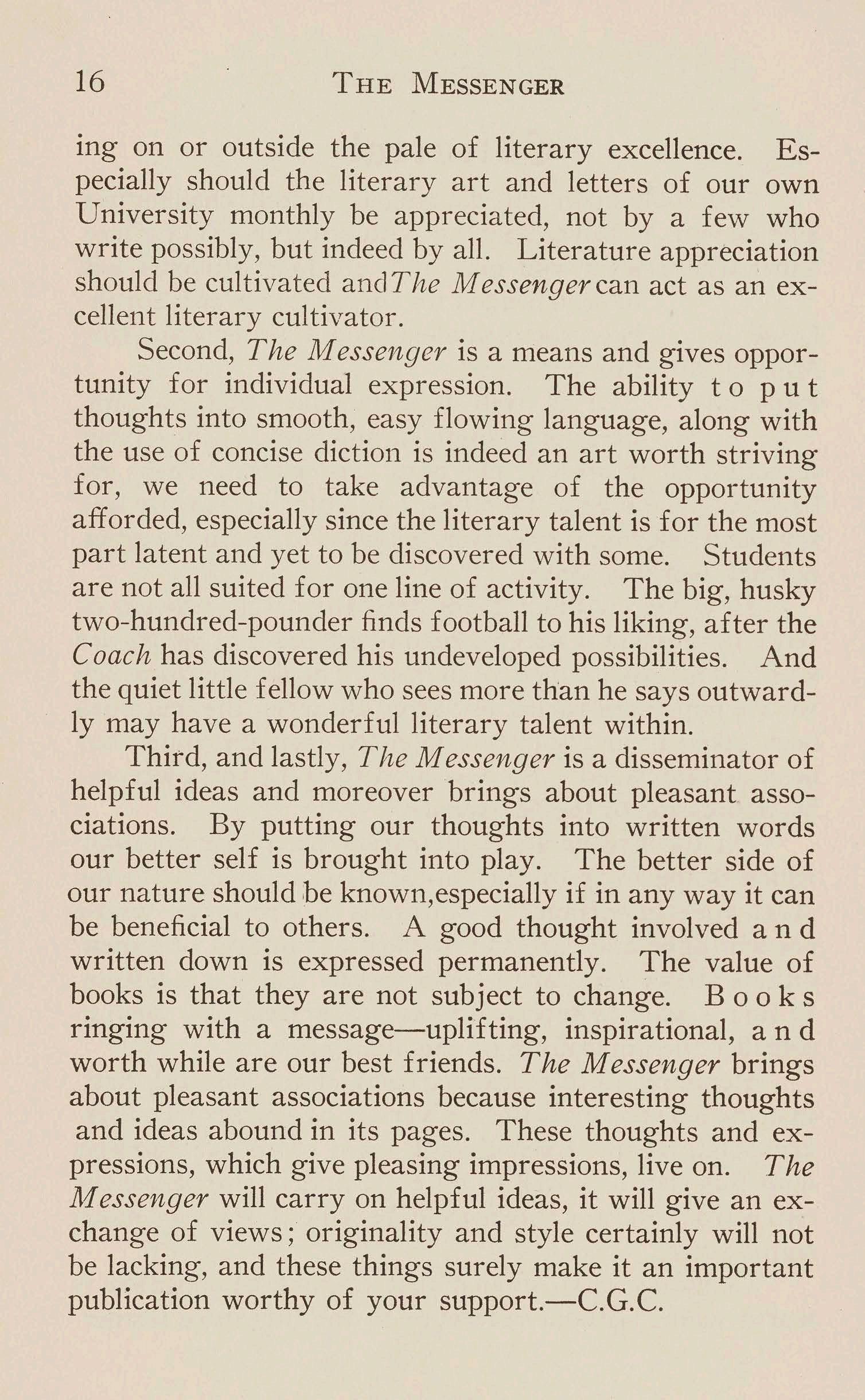
ing on or outside the pale of literary excellence. Especially should the literary art and letters of our own University monthly be appreciated, not by a few who write possibly, but indeed by all. Literature appreciation should be cultivated anclThe Messengercan act as an excellent literary cultivator.
Second, The Messenger is a means and gives opportunity for individual expression. The ability t o p u t thoughts into smooth, easy flowing language, along with the use of concise diction is indeed an art worth striving for, we need to take advantage of the opportunity afforded, especially since the literary talent is for the most part latent and yet to be discovered with some. Students are not all suited for one line of activity. The big, husky two-hundred-pounder finds football to his liking, after the Coach has discovered his undeveloped possibilities. And the quiet little fell ow who sees more than he says outwardly may have a wonderful literary talent within.
Third, and lastly, The Messenger is a disseminator of helpful ideas and moreover brings about pleasant associations. By putting our thoughts into written words our better self is brought into play. The better side of our nature should be known,especially if in any way it can be beneficial to others. A good thought involved a n d written down is expressed permanently. The value of books is that they are not subject to change. Books ringing with a message-uplifting, inspirational, and worth while are our best friends. The Messenger brings about pleasant associations because interesting thoughts and ideas abound in its pages. These thoughts and expressions, which give pleasing impressions, live on. The A1essenger will carry on helpful ideas, it will give an exchange of views; originality and style certainly will not be lacking, and these things surely make it an important publication worthy of your support.-C.G.C.

~eekergof jf orgetfulnegg
J. R. SAUNDERS)
'23
I
They co111efrom the hot house of wealth 1
From the dark 1 grim 1 homes of despair 1
Where joy and the blessing of health
Have departed with love 1 so fair.
They come with their sorrow and woe 1
W ,ith a life that has much to regret 1 They could stand it no longer 1 and so They go down to the sea to forget.
II
They come from the east and the west 1
Every nation and race and clime 1
Seeking the long sought rest 1
From the pain and the wounds of time.
They feel that the God of the land
Will be kinder at sea 1 so let
The earth and its pleasures stand 1
While they sail the sea 1 to forget.
III
Thus has it been through the ages 1
When the world has gone wrong with men 1 They have sought out of the storm that rages 1
Meeting death in the sea as a friend.
Out on the deep in their ships 1
Hoping that peace would come yet 1
Dreaming of long lost lips 1
Asking God to help them forget.

IV
But the sea is a terrigle mistress, Her lovers are strong men and true, Their courage has stood througt the test, And they're ready to try it anew. So many drop out of the fight For a place in her kingdom fair, But the men who fought for the light, On the sea found it shining there.
V
For our trials we have for a reason, And the pain will all be forgot, It only can last for a season, If our manhood is still without blot. From the calm of the sea at night, From the storm that will reason beset, We may learn that all things are right, And we do not need to forget.

J!}ostis J!}ost
VIRGINIA RICHARDSON) '22.
Claire, as the door closed behind the "bell hop", sat on the edge of the bed. With a disgusted look at her neat brown pumps, she kicked them to the middle of the floor. She skinned the damp stockings from her swelling feet which she pressed on the cool matting. It was good to find something cool ! The dinner hour was drawing near, so the girl started to dress. Toilet articles, frocks. white slippers, and numerous odds and ends that go in a. traveling bag, were removed. She had bathed and dressed, all except her slippers and stockings; it was such fun to pad around the room over the slippery matting, bare-footed. A last stray lock was pinned up, a final dab of powder, and she was ready for her shoes and stockings. She looked on the bed for the pair of white silk hose, but they were not there. Hurridly she turned the bag upside down, and dumped out the contents; she searched under the bed; then again sorted the collection of handkerchiefs, hair pins, and other things,trying to find the missing hose. They were surely gone; she had evidently forgotten to . pack them. What was she to do! It was nearly dinner time; and she had to be prompt, because there was only one service here. Quickly she slipped on the brown stockings, and snatched up her slippers. Alas, no amount of pushing and pulling could make the poor swollen feet slip into the tight new pumps. She must do something and do it now.
Suddenly as she heard a door slam in the hall, a brilliant idea occurred to her. There was a woman across the way, whom she had seen go out a little while before. Claire pushed the button frantically, and, diving into a

pocket of her jacket, found her ever-ready notebook and pencil. She scribbled a message :
«Am in dire circumstances. Please let me borrow a pair of white hose. Will reimburse for any damage done. 11
The bell boy came. She stuck the folded no te in hi s hand and said, "Take this across the hall , and wait for an answer."
She stood there behind the closed door, tight 1 y holding the knob. At the light tap on the pannel, she cau t iously opened the door, took a small ward of hosiery with a note pinned to it. "What a gift it is to be ob serving!" she thought, smiling to herself. She unfolded the package-sock s ! Brand new white silk sock s with black and white clock s ! She seized the note and read it.
' ' J ust happened to have these; will they do you a ny good?11
"Will they? Will they?" she frantically asked. Another idea popped into her head. "Will they! Oh, you clear sister across the hall, these were probably for your brother's birthday present, but I'll buy you a new pair. Here goes!" and she slipped her feet into the cool, clinging hose. By folding them under an inch or two at the toe, and putting rubber bands around the tops, she found she could manage very well. Her comfy old white slippers covered up the toes. She stood on the chair in front of the mirror, and found that her dress hid the tops all right. Just then a bell sounded loud and insistent, she supposed it was time to eat.
Besides herself, there were only three others in the dining-room . A young man and the woman she had seen come out of the room across the hall were at one table. At another was an elderly man . Since there were no other tables set, she took the place at the table with the

old gentleman. None of them paid any particular attention to her, so she ate in almost perfect silence, answering in monosyllables a few remarks made by her companion. Her attention was divided between the food, the other table, and, especially, her hose. When she could keep from squirming her feet out of sight long enough, she tried to catch the lively conversation from t h e o t h e r couple; and in the time that was left, she ate.
At last the meal was over. Claire lingered a few moments to let the others go out first, but the discussion at their table was heated. She found she might just as well go. As she walked to the door, she could feel the eyes of the woman and young man following her. What was the woman thinking? And the man? She knew he could tell in an instant she had on socks! Oh, to be able to grab up her skirt and run and scream, "Yes, they're socks, and borrowed, too!"
\i\Then she undressed, she rinsed out the socks, and hung them on her chair to dry. For some time she lay there in bed, laughing at the predicament she was in, and congratulating herself on her presence of mind.
"Saturday morning and nothing to do. Well, Claire clear, don your suit, squeeze into your pretty new pumps, and go sight-seeing over town."
Thus she spent the morning. There were the main street, the new high school, the Methodist, Presbyterian, and Lutheran Churches, the Johnston mansion, and the creek to be seen. In a short time, Claire returned to her room, and as she opened the door she almost stepped on a slip of paper stuck under it.
"Please return the socks. I 1nust have them this afternoon."
How mortifying! She hadn't the nerve to take them

herself, so she sent for the boy again, and had him deliver them "to the room across the hall."
"One half-day gone," she sighed. She and the old g-entleman had been the only ones at lunch. It was dull enough anyway,but the other couple did enliven the dining-room a little, if it was only the sound of their voices and laughter. She sighed again; started to leave the window where she was sitting, and then decided to stay. For some time she sat with her elbow propped on the sill, and her c h i n cupped in her hand. She was looking off-thinking. Every now and then she started to hum a snatch of song, but none would come except a few measures from the middle of a verse. Her elbow slipped. A series of tingling shocks quivered up and down her arm. The reverie was broken, and strange to say she noticed, for the first time, a tennis court almost below the window. About that time a couple, whom she recognized as the two younger guests, started a game.
"Hum-m-m !" She was puzzled in making this discovery. What was it the note said? Something about needing the socks this afternoon. She thought the woman was leaving. Why did she need them this afternoon if she were not going away? She certainly could not have sent them to anybody after they h a d b e e n washed. She had been so hot and disgusted with herself that she entirely forgot to off er to buy a new pair.
"Oh, well.!"
She paused; and then-''Plague it all! why do brothers like to torment you by betting you that you couldn't stay in some god-forsaken country hamlet for two weeks without writing home! It wouldn't be so bad if the express company didn't try to see how far beyond your station they could send your suitcase, containing practically your entire wardrobe. Ding! Ding!

Ding!" she finished, accenting, each one with a vigorous knock on the window ledge.
* * * *
"Whew ! Its late!" Claire jumped up and started to dress, then remembered . She wanted to take those brown slippers and pound and pound and pound them. She hated shoes! and stockings, too! She hated brothers and hotels and-! There was a knock. She answered, "Yes?" slipped on her kimona, and opened the door. The boy was smiling; he handed her a small package wrapped in newspaper. She took it, looking at him quizzingly. For a moment she held the paper in her hand, and then she laughed. She sat on the bed, unfolded the wrapping, took a pair of white silk socks with black and white clocks, one in each hand. She held them out and looked at them; then drew one on each foot.
"I should worry," she told her reflection in the mirror, as she brushed her hair.
Something possessed her that night. "Two weeks!" flew through her mind. "I'll stick it out or bust; and I'll have a good time, too!"
As she entered the dinning-room, she found the others were already there. "Have a good time!" she made herself say. She smiled at the woman, she also caught the young man's eye, and smiled at him. Both nodded and smiled at her. She spoke to the elderly man, and took up the conversation he eagerly began. It was a pleasant meal. Her spirits were greatly refreshed, and her humor high.
"So far, so good. May as well take another chance."
That is how she happened to go out on the porch, and choose an inviting, comfortable rocking chair. She even forgot to hide her feet. The screen door slammed;
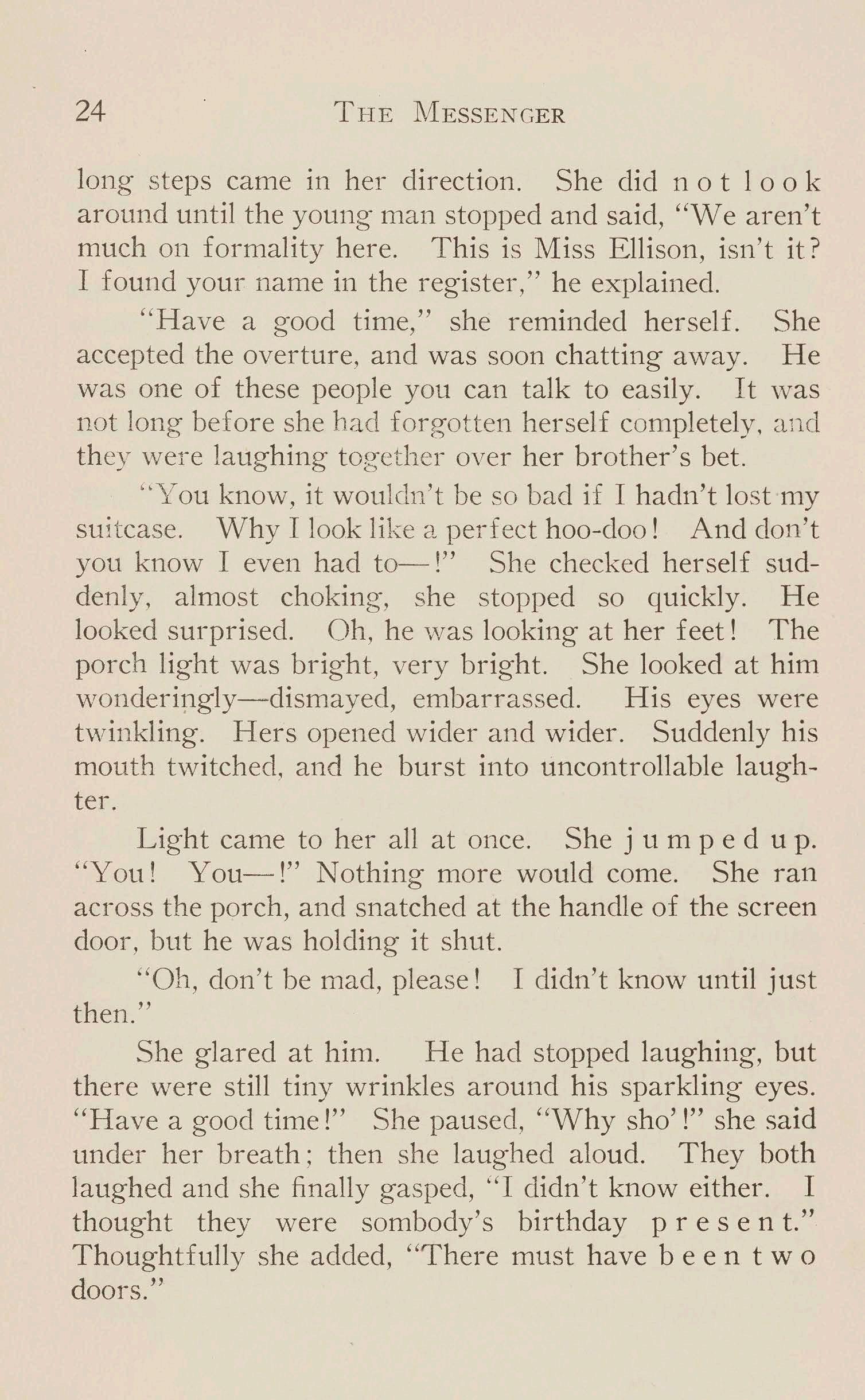
long steps came in her direction. She did n o t 1 o o k around until the young man stopped and said, "We aren't much on formality here. This is Miss Ellison, isn't it? I found your name in the register," he explained.
"Have a good time," she reminded herself. She accepted the overture, and was soon chatting away. He was one of these people you can talk to easily. It was not long before she had forgotten herself completely, and they were laughing together over her brother's bet.
'' You know, it wouldn't be so bad if I hadn't lost my suitcase. Why I look like a perfect hoo-doo ! And don't you know I even had to-!" She checked herself suddenly, almost choking, she stopped so quickly. He looked surprised. Oh, he was looking at her feet! The porch light was bright, very bright. She looked at him wonderipgly-disrnayed, embarrassed. His eyes were twinkling. Hers opened wider and wider. Suddenly his mouth twitched, and he burst into uncontrollable laughter.
Light came to her all at once. She jumped up. ''You! You-!" Nothing more would come. She ran across the porch, and snatched at the handle of the screen door, but he was holding it shut.
"Oh, don't be mad, please! I didn't know until just then."
She glared at him. He had stopped laughing, but there were still tiny wrinkles around his sparkling eyes. "Have a good time!" She paused, "Why sho' !" she said under her breath; then she laughed aloud. They both laughed and she finally gasped, ''I didn't know either. I thought they were sombody's birthday present." Thoughtfully she added, "There must have been two doors."
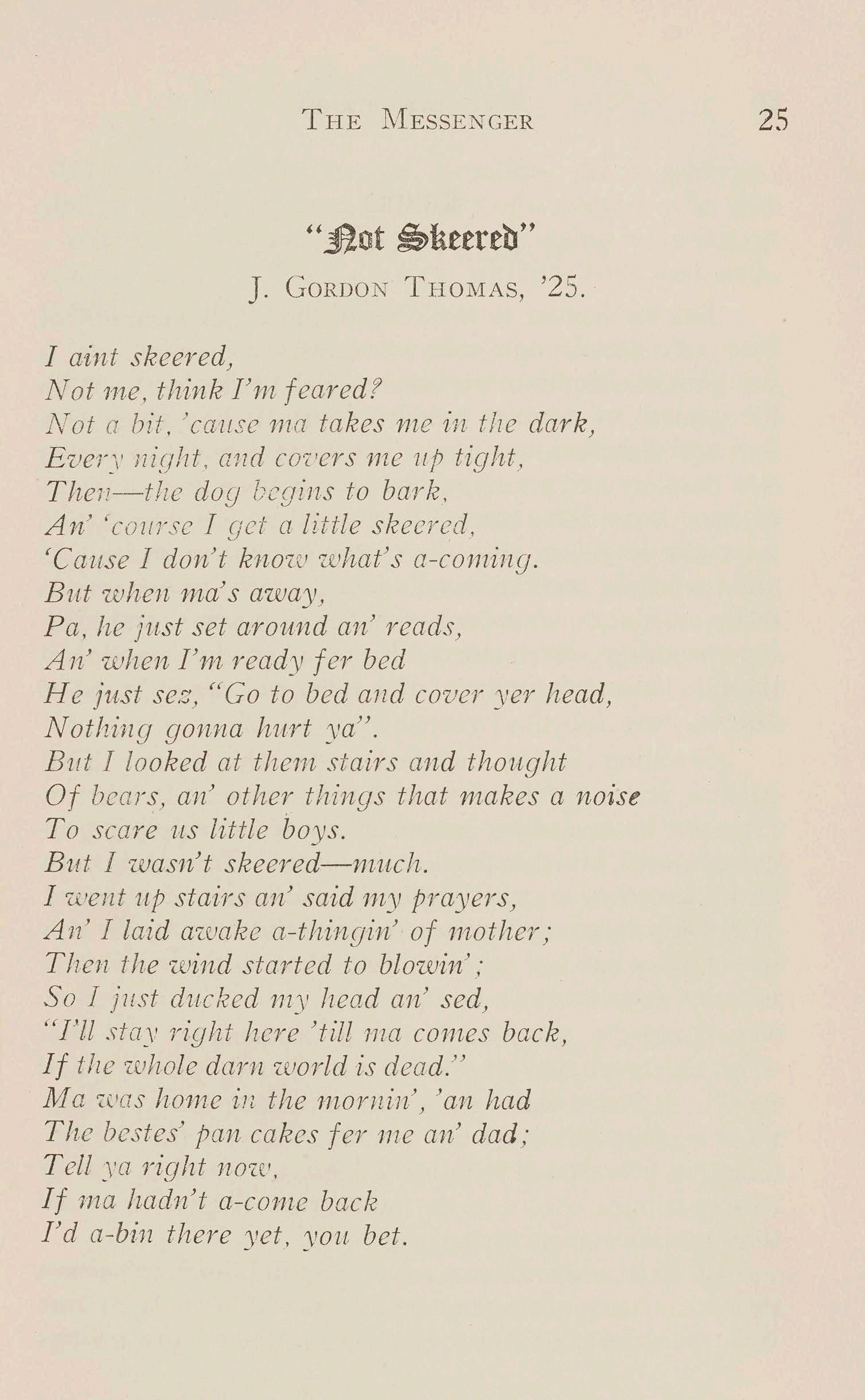
"j!ot ~keereb"
J. GORDON THO:MAS, '25.
I aint skeered, Not me, think I'm feared?
Not a bit. 1 ca115:e111atakes 111ein the dark, Every ni.r;ht, and CO'i.'ersme 11ptight, Tlz en-tfie doy begins to bar!,,
An/ 'c ourse I get a little s!ceered, 'Cause I don't kno·w idiat' s a-coming .
But when 11ia' s away, Pa, he just set around an' reads, An' when 1'111 , ready fer bed
He just se:::,"Go to bed and cover yer head, Nothing gonna hurt ya 1 '.
But J looked at them stairs and tho1tght Of bears, an 1 other thinys that makes a noise To scare us little boys. But I wasn't skeered-niuch.
I went 11pstairs an' said my prayers, An' I laid aivake a-th:ingin' of mother; Then tlze wind started to blowin' .: So I just duclced 111)' head ari1 sed, ''I'll stay right here 1 till 11lacomes back, If tlie zolzo!e dar11 world is dead.,, l'vla :(•as lzo111ein the mornin 1 , 1 an had Th e bestcs 1 pan cakes fer 111ean 1 dad; Tell ya right now, If 111ahadn 1 t a-come bad: I'd a-bin there · yet, "JOU bet.

1!,iking
WARREN G. KEITH, '23.
Let me hasten to make clear the exact meaning of hike. A decade ago this word was colloquial. It is found in the familiar: Sis! Boom! Bah! Hike 'em! With the growth of popular modern sports it has assumed a new and dignified meaning. The sport now called hiking was once termed tramping, but the hoboes and vagrants of hard times have caused that word to fall into disuse. Even the Regulars with their very intelligent shave-tails and corporals, use the word when it refers to excursions made on foot or horseback-shades of blisters, and kicking, neighing war horses! From a popular standpoint these laborious fatigues of the army can never be called hikes.
Strolling is not included under this term. That pastime is for the lovelorn and the anemic. It must of necessity have a silver moon, shady trees, rippling gurgling brooks, and a happy environment. Externals must be in accord or a stroll yields the minimum of pleasure. These words are not spoken to depreciate the stroll-for bliss knows but few other habitats than in the brief space between two lovers so occupied.
Decidedly the hike is not a promenade. As that word is mentioned, the mind teems with pictures and scenes-a board walk; the ocean; a casino; stuffy, smokefilled rooms; baccarat; the maudlin ways of the woman. The true promenade requires a demoiselle, and avenue of closely clipped chestnuts or mulberries, fragrance of old wine, and beaucoup chattering.
In contradistinction to the foregoing, hiking does not depend on any particular set of conditions. If at any time the externals become unpleasant, then a few swings
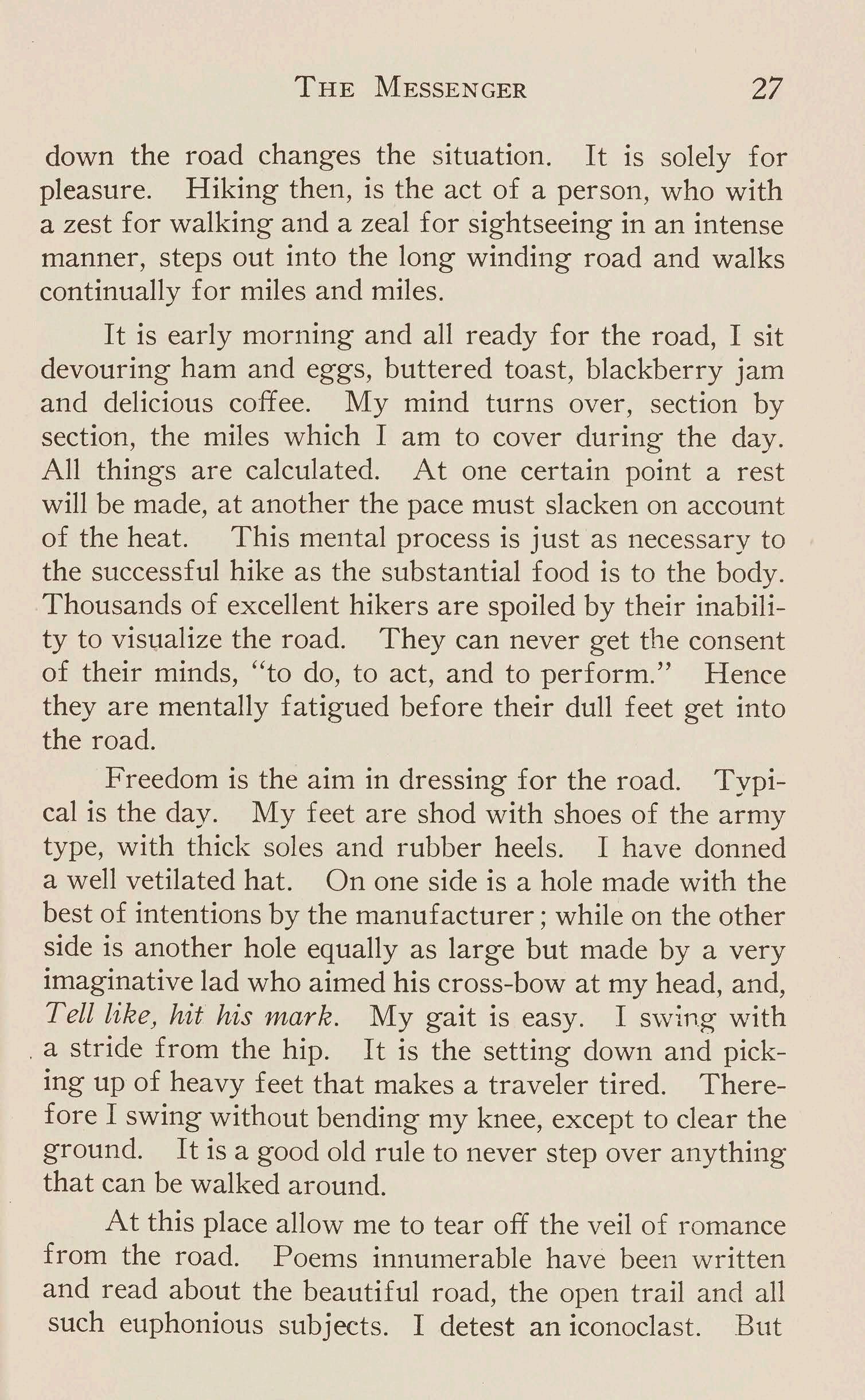
down the road changes the situation. It is solely for pleasure. Hiking then, is the act of a person, who with a zest for walking and a zeal for sightseeing in an intense manner, steps out into the long winding road and walks continually for miles and miles.
It is early morning and all ready for the road, I sit devouring ham and eggs, buttered toast, blackberry jam and delicious coffee. My mind turns over, section by section, the miles which I am to cover during the day. All things are calculated. At one certain point a rest will be made, at another the pace must slacken on account of the heat. This mental process is just as necessary to the successful hike as the substantial food is to the body. Thousands of excellent hikers are spoiled by their inability to visualize the road. They can never get the consent of their minds, "to do, to act, and to perform." Hence they are mentally fatigued before their dull feet get into the road.
Freedom is the aim in dressing for the road. Typical is the day. My feet are shod with shoes of the army type, with thick soles and rubber heels. I have donned a well vetilated hat. On one side is a hole made with the best of intentions by the manufacturer; while on the other side is another hole equally as large but made by a very imaginative lad who aimed his cross-bow at my head, and, Tell like, hit his mark. My gait is easy. I swing with . a stride from the hip. It is the setting down and picking up of heavy feet that makes a traveler tired. Therefore I swing without bending my knee, except to clear the ground. It is a good old rule to never step over anything that can be walked around.
At this place allow me to tear off the veil of romance from the road. Poems innumerable have been written and read about the beautiful road, the open trail and all such euphonious subjects. I detest an iconoclast. But

I am forced to believe that the writers of s uch ver se draw their inspiration from pipe dream s , picture s , or persons equally misinformed.
Yes, give me the long road with the sweat, bees, and yellow jackets, yes, and the gnats, too, flying in my wake. teasing, stabbing, and urging me to turn back. Give me the inviting trail when the torrid sun blisters the pink face of the pond lilies. Let me per spire like a draft horse until, as swinging up a steep hill, I breathe the salty excretion and then throw a strangling fit on the side of the road among the burdocks. Let the pebbles so round and smooth gouge out kettle holes in my shoulder b 1 a cl e s; while the roots of some friendly oak like the advance guard of a glacier scoop out valleys down the s p i n a 1 column. Then does anyone think that just around the bend of the road is a shady grove, a cove filled w i t h odiferous flowers and a spring of cold water? Never! Around the corner is a dusty road lined with dusty sumac and green briars and no umbrageous cool for miles.
The hike along any road is like life-up and clown. Beauty and ugliness are side by side. I find the sweetest fact of all is the delicious surprise that comes now and then. The call of the road, the lure of the road, is not what the poet dreams. The savage nature in man seeks release. It begs him to leave off civilization and live.
The kind of a road-mate like a desert varies with the taste. There are three: man, woman, and dog. One might choose a woman! After due trial common experience teaches that for all ordinary purposes the dog is most acceptable.
"Come on let's take a hike." "Oh why? I can't see any use of walking away over there an' gettin' all hot an' dusty an' tired."

Herewith, then, is a specimen of conversation from a man of this type after the road is reached.
"We will have to stop, I am gettin' my feet all blistered- or my skin is chafed---or my corns hurt." Perhaps he is brave, then will he say: ''My sock is all balled up in my shoe, or my trousers are really too tight for walking." Then I must lead the poor pilgrim to a wayside station or hail a passing car to remove the debris to town. \Nhile he murmurs over the sad predicament of balled socks of skin tight clothing, I am allowed to contemplate with seeming serenity on t h e lost sport, the walk beside the surging waters, the smell of the firs and larches, or a drink from the cool spring far down the road.
Sometimes a person is found who enjoys the rough old road, many times I have walked along down the way with such a one speaking but few words, so completely is the understanding that exists between real hikers.
Fidelity so characteristic of a dog is well exhibited on a hike. Indeed his splendid companionship, so familiar to everyone is ideal. I prefer the dog.
A true woman is naturally unable to meet the exhaustive physical strain of thirty or forty miles per day. Many can perform this distance, but they are usually lacking in those gentler qualities so much admired by man. On a stroll a woman is an admirable companion. The very great gulf between a stroll and a hike makes it impossible to convey the sweet and gentle influence of a woman from the one to the other. I think the exceptional man would go on the hike without a companion, but the regular hiker would see reasons to abridge his hike to conform to the tastes of his road -mate.
Decidedly the mountains, knobs, and tall hills are the be st places to hike. The monotony of level country
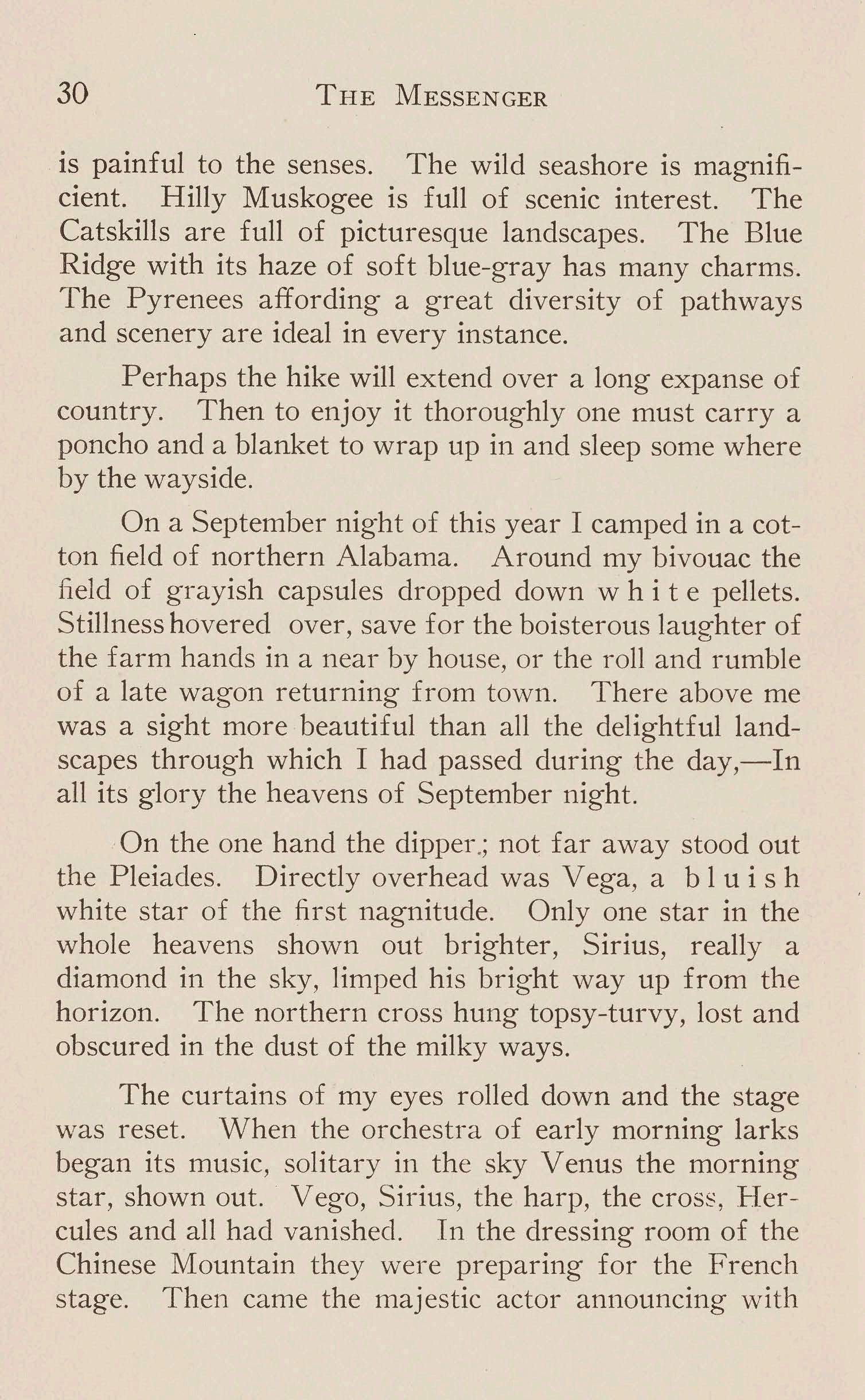
is painful to the senses. The wild seashore is magnificient. Hilly Muskogee is full of scenic interest. The Catskills are full of picturesque landscapes. The Blue Ridge with its haze of soft blue-gray has many charms. The Pyrenees affording a great diversity of pathways and scenery are ideal in every instance.
Perhaps the hike will extend over a long expanse of country. Then to enjoy it thoroughly one must carry a poncho and a blanket to wrap up in and sleep some where by the wayside.
On a September night of this year I camped in a cotton field of northern Alabama. Around my bivouac the field of grayish capsules dropped down white pellets. Stillness hovered over, save for the boisterous laughter of the farm hands in a near by house, or the roll and rumble of a late wagon returning from town. There above me was a sight more beautiful than all the delightful landscapes through which I had passed during the day,-In all its glory the heavens of September night.
On the one hand the dipper .; not far away stood out the Pleiades. Directly overhead was Vega, a b 1 u i sh white star of the first nagnitude. Only one star in the whole heavens shown out brighter, Sirius, really a diamond in the sky , limped his bright way up from the horizon . The northern cross hung topsy-turvy, lost and obscured in the dust of the milky ways.
The curtains of my eyes rolled down and the stage was reset . When the orchestra of early morning larks began its music, solitary in the sky Venus the morning star, shown out. V ego, Sirius , the harp, the cross, Hercules and all had vanished. In the dressing room of the Chinese Mountain they were preparing for the French stage. Then came the majestic actor announcing with
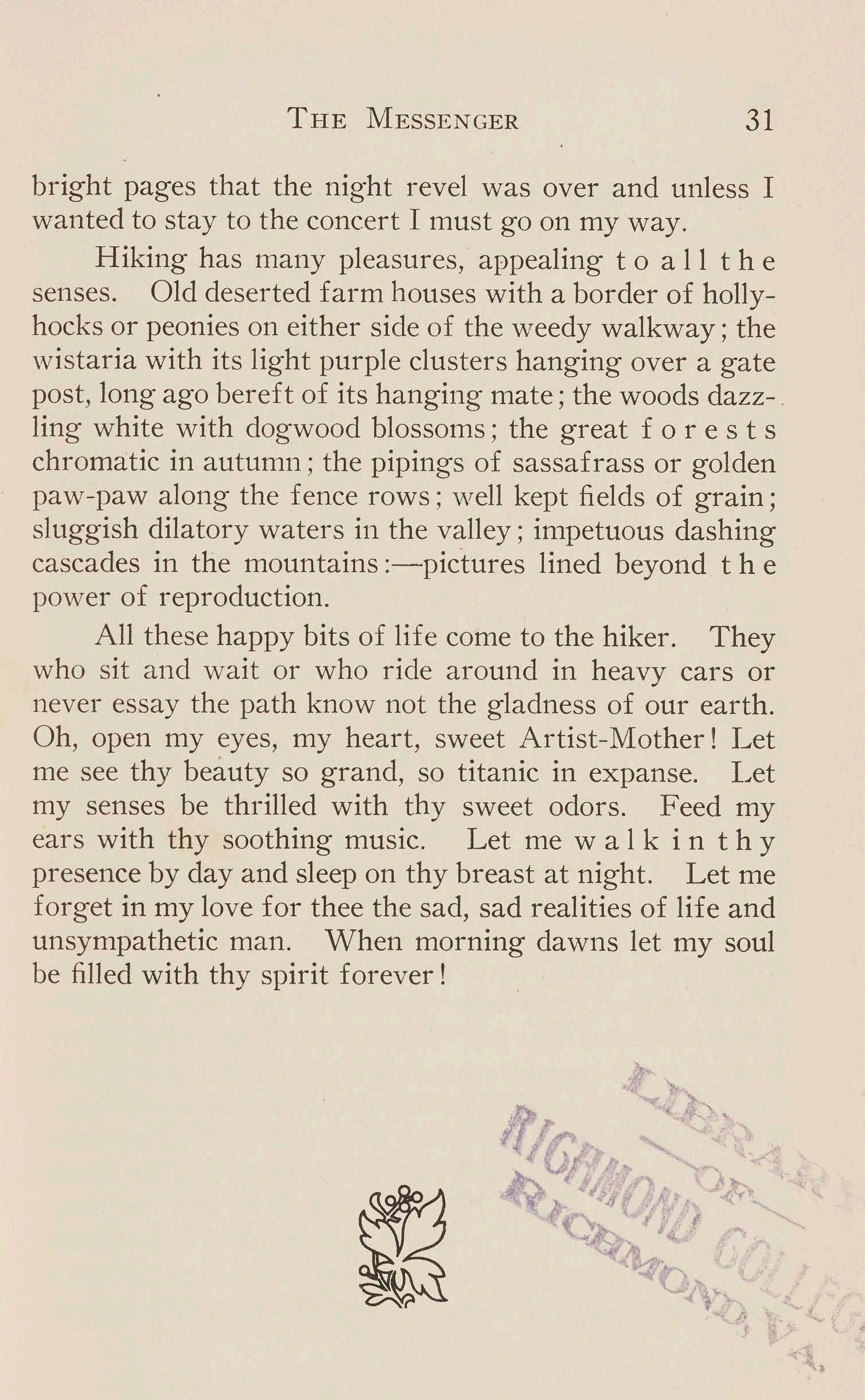
bright pages that the night revel was over and unless I wanted to stay to the concert I must go on my way.
Hiking has many pleasures, appealing t o a 11 th e senses. Old deserted farm houses with a border of hollyhocks or peonies on either side of the weedy walkway; the wistaria with its light purple clusters hanging over a gate post, long ago bereft of its hanging mate; the woods dazz- . ling white with dogwood blossoms; the great f o r e s t s chromatic in autumn; the pipings of sassafrass or golden paw-paw along the fence rows; v.rellkept fields of grain; sluggish dilatory waters in the valley; impetuous dashing cascades in the mountains :-pictures lined beyond t h e power of reproduction.
All these happy bits of life come to the hiker. They who sit and wait or who ride around in heavy cars or never essay the path know not the gladness of our earth. Oh, open my eyes, my heart, sweet Artist-Mother! Let me see thy beauty so grand, so titanic in expanse. Let my senses be thrilled with thy sweet odors. Feed my ears with thy soothing music. Let me w a 1 k i n t h y presence by day and sleep on thy breast at night. Let me forget in my love for thee the sad, sad realities of life and unsympathetic man. When morning dawns let my soul be filled with thy spirit forever!
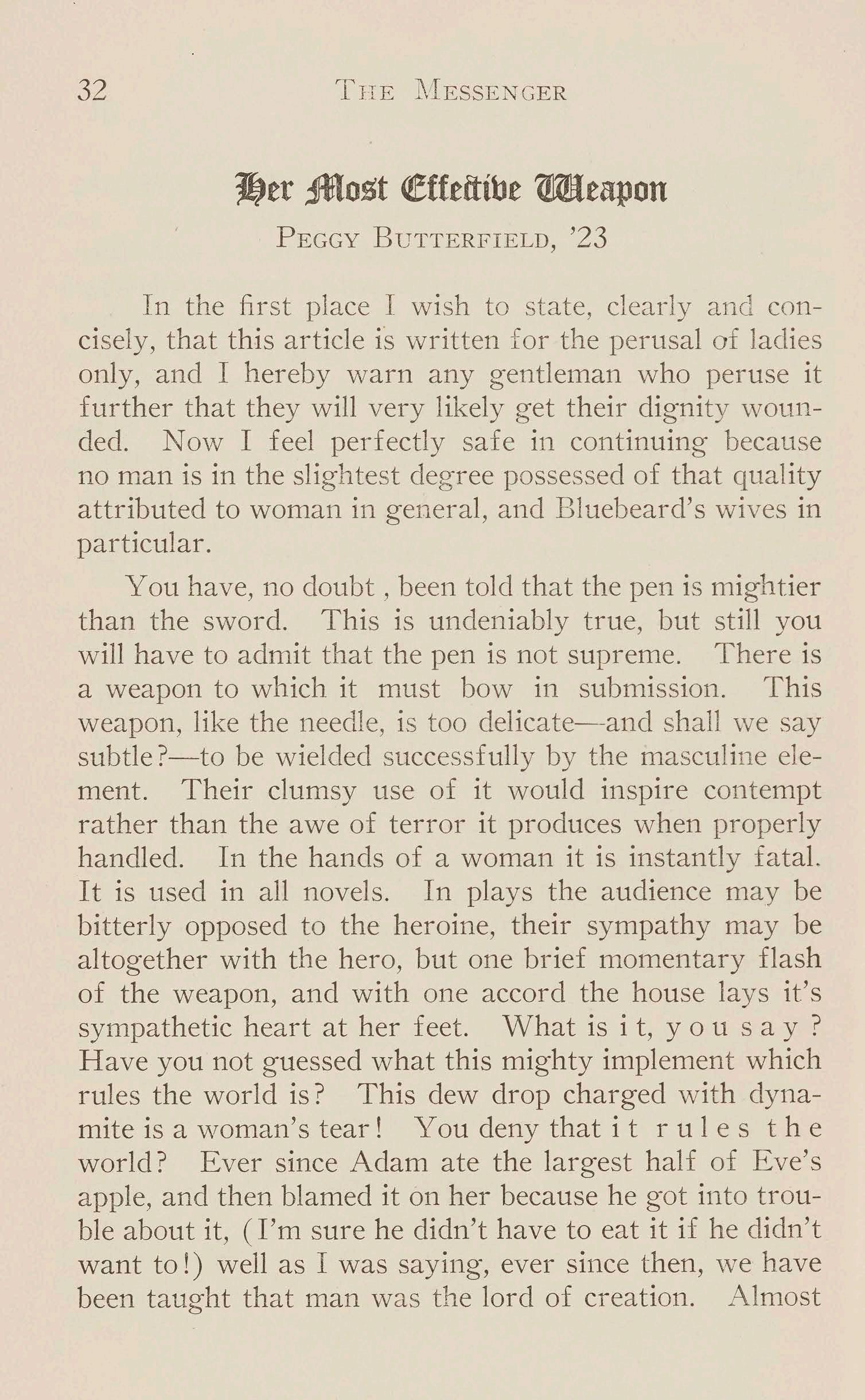
Jt,erJlost (fffedtbe~eapon
PEGGY BUTTERFIELD, '23
In the first place I wish to state, clearly an d concisely, that this article is written for the perusal of ladies only, and I hereby warn any gentleman who peruse it further that they will very likely get their dignity wounded. Now I feel perfectly safe in continuing because no man is in the slighte st degree possessed of that quality attributed to woman in general, and Bluebeard's wives in particular.
You have, no doubt, been told that the pen is mightier than the sword. This is undeniably true, but still you will have to admit that the pen is not supreme. There is a weapon to which it must bow in submission. This weapon, like the needle, is too delicate-and shall we say subtle ?-to be wielded successfully by the masculi n e element. Their clumsy use of it would inspire contempt rather than the awe of terror it produces when properly handled. In the hands of a woman it is instantly fatal. It is used in all novels. In plays the audience may be bitterly opposed to the heroine, their sympathy may be altogether with the hero, but one brief momentary flash of the weapon, and with one accord the house lays it's sympathetic heart at her feet. What is it, you say ? Have you not guessed what this mighty implement which rules the world is? This clew drop charged with dynamite is a woman's tear! You deny that it r u 1 es the world? Ever since Adam ate the largest half of Eve's apple, and then blamed it on her because he got into trouble about it, ( I'm sure he didn't have to eat it if he didn't want to!) well as I was saying, ever since then, we have been taught that man was the lord of creation. Almost
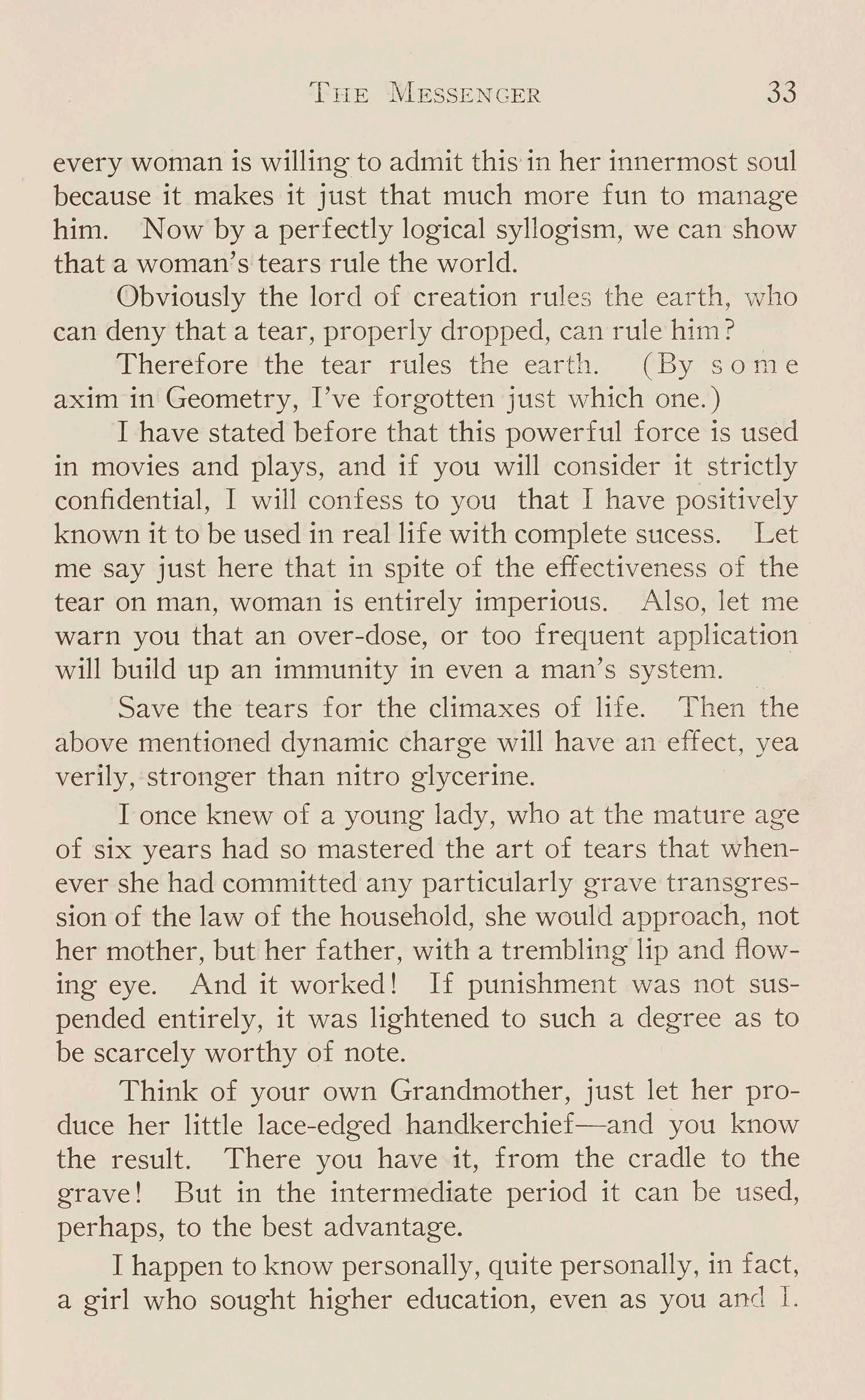
every woman is willing to admit this , in her innermost soul because it makes it just that much more fun to manage him. Now by a perfectly logical syllogism, we can show that a woman's tears rule the world.
Obviously the lord of creation rule s the earth, who can deny that a tear, properly dropped, can rule him?
Therefore the tear rules the earth, ( By s o m e axim in Geometry, I've forgotten just which one.)
I have stated before that this powerful force is used in movies and plays, and if you will consider it strictly confidential, I will confess to you that I have positively known it to be used in real life with complete sucess. Let me say just here that in spite of the effectiveness of the tear on man, woman is entirely imperious. Also, let me warn you that an over-dose, or too frequent application will build up an immunity in even a man's system.
Save the tears for the climaxes of life. Then the above mentioned dynamic charge will have an effect, yea verily, stronger than nitro glycerine.
I once knew of a young lady, who at the mature age of six years had so mastered the art of tears that whenever she had committed any particularly grave transgression of the law of the household, she would approach, not her mother, but her father, with a trembling lip and flowing eye. And it worked! If punishment was not suspended entirely, it was lightened to such a degree as to be scarcely worthy of note.
Think of your own Grandmother, just let her produce her little lace-edged handkerchief-and you know the result. There you have it, from the cradle to the grave! But in the intermediate period it can be used, perhaps, to the best advantage.
I happen to know personally, quite personally, in fact, a girl who sought higher education, even as you and I.

But unfortunately said higher education was getting just a trifle too high for her in one particular subject. The examination came as all exams will, and she worked on it for three enternal hours. When she finally went out into the world again, she had left behind her all that she had ever known about that subject and oh! so much more that she hadn't ever known. But if she didn't know math, there were some things she did know , and-well the Prof. was a kindly old soul. Perhaps it was a mean advantage to take, but "all's fair in love and war" and if math isn't war according to Sherman, I don't know what is. The result was perfect , she didn't even get to the dripping stage. If she had, she might have gotten an A, but she was not a greedy girl and when she had secured a C, she reversed the line of direction of the corners of her mouth, put her handkerchief in her pocket, and smiled sweetly from behind her artistically damp lashes.
As for what one might do with a youth of one's own age in this line I cannot say, for I never quite dared to try it. But I have been told, and on very good authority, that the effort was well-overwhelming to say the least.
As I say, this delicate instrument should be saved for climaxes, so I am waiting for some fitting climax when I may wield my most effective weapon to the very best advantage.

<fbwarb~bitf r!}ullucination
C. N. SNEAD, '23.
The repair shops of the Piedmont Motor Company were running over time. Spring was approaching, and everybody seemed anxious to have the old bus in condition for the season so near at hand.
It was due to this fact that Edward White, the head mechanic and young man of twenty-five, was late reaching his home one day for the evening meal. His wife, whom he had married two years before, noticed the wornout expression on Ed's face. Ed was her own abbreviation for Edward; she had called him that when they were sweethearts , and he was still just Ed to her. But this time, she saw in Ed ' s face something more than fatigue, and when she noticed that, her h eart beat ju st a little faster, for the expre ss ion was new to him. H e had always been so jovial, care free and full of life. She w as almost excited because Ed wa s plainly feeling discouraged.
"Ed ! she exclaimed, are you ill ?"
Ed did not say a word for a few seconds; in stead. he frowned as though Mary's question had irritated him. Then suddenly he turned so that he faced her squarely and said:
"Ill, did I say anything about being ill?"
Mary gave a little start. She was not used to Ed being cross with her, but she said nothing. They sat down to eat. Mary had always been a model wife, and held Ed's comfort and happiness above her own. It was due to her persistent help and companionship that Ed had managed to buy the comfortable bungalow in which they lived. Always she looked forward to his coming home at nights as the climax to her
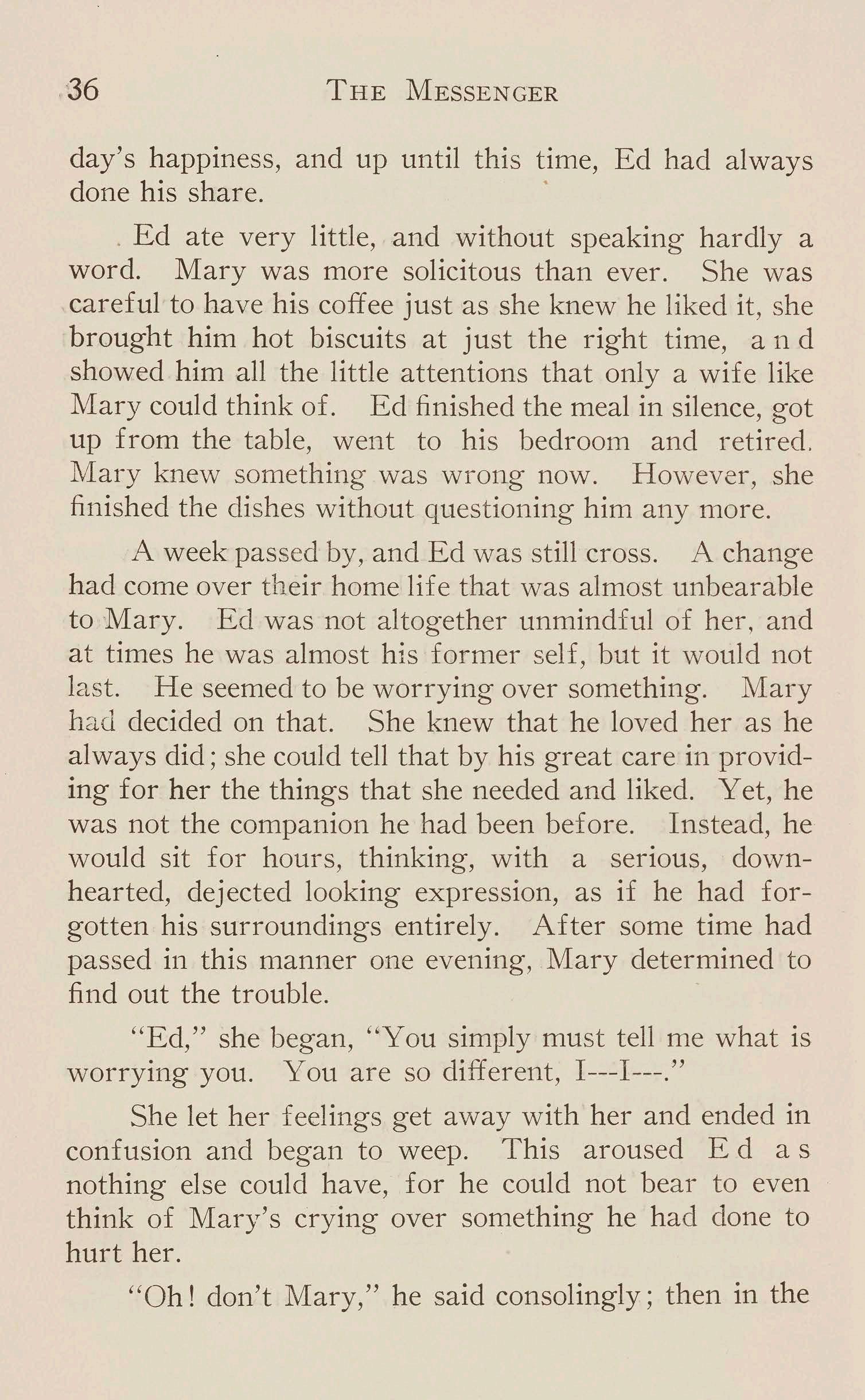
day's happiness, and up until this time, Ed had always done his share .
. Ed ate very little, and without speaking hardly a word. Mary was more solicitous than ever. She was careful to have his coffee just as she knew he liked it , she brought him hot biscuits at just the right time, and showed him all the little attentions that only a wife like Mary could think of. Ed finished the meal in silence, got up from the table, went to his bedroom and retired . Mary knew something was wrong now. However , she finished the dishes without ques t ioning him any more.
A week pass ed by, and Ed was still cross. A change had come over their home life that was almost unbearable to Mary. Ed was not altogether unmindful of her, and at times he was almost his former self , but it would not last. He seemed to be worrying over something. Mary h a d decided on that. She knew that he loved her as he always did; she could tell that by his great care in providing for her the things that she needed and liked. Yet, he was not the companion he had been before. Instead, he would sit for hours, thinking, with a serious, downhearted, dejected looking expression, as if he had forgotten his surroundings entirely. After some time had passed in this manner one evening, Mary determined to find out the trouble.
"Ed," she began, " You simply must tell me what is worrying you. You are so different , I---1---."
She let her feelings get away with her and ended in confusion and began to weep. This aroused E d a s nothing else could have, for he could not bear to even think of Mary's crying over something he had done to hurt her.
"Oh! don't Mary," he said consolingly; then in the

vernacular of the workshop he muttered half to himself, "I'm just a damned fool".
He had never kept anything from Mary b e f o r e. When he thought of that a feeling of shame came over him , and he began to dispise himself most cordially. Ed was discouraged, and he had been laboring under the impression that Mary should not know it-as if he could keep from it! He resolved to tell her all, and with that resolution even, he felt some relief. Moving closer to her he managed in his old time winning way to stop the tears. Then he began-
"I'm sorry, dearest; I didn't know that I was hurting you." It seemed he could get no further.
"But Ed, if I only knew, I-I might help."
For a minute Ed was silent. Then, "I've been a fool Mary", he said. "I was afraid you would not understand". He suddenly wondered why he had ever thought she would not, for Mary had always been more than a wife in name; she had been his helpmate. He continued:
"Mary, I'm beginning to see that I am a failure; just a plain failure", he ended almost to himself.
"Why Ed," Mary ejaculated, "the very idea!"
"Oh, I know what you would say," he intercepted. "You think that because we have saved enough to buy our own home and every thing that we ought to be satisfied."
He used "we" unconsiously, but Mary noticed it and was glad.
"And so we ought," she replied--she helped Ed out by using the same "we". "Why Ed, you must remember that you are still a young man; you own your own car, your own home, and there's the bank account just started, and besides, and above all, you are known for miles around as the very best mechanic in the city."

Ed smiled faintly.
"There's the trouble Mary. A mechanic; why anybody could be a mechanic. I used to think that a skilled mechanic meant something, but I was a kid then, and now I'm beginning to see that life is somethingmorethan being young. J'm in for life; to be a mechanic: just a mechanic for life!" His last words sounded like a sentence pronounced by some high ju1ge on a murderer.
The next day was Saturday, and as usual Ed appeared at the shops on time. His fellow workers had already noticed that something was coming over him. He was serious now where he had been so lighthearted before, and each day they could notice a growing difference for his work. Yet no one ventured to enquire the trouble. The day wore through, and Ed went home again. Mary met him at the door, and he smiled when he saw her, but said little. He had the air of expression of one resigned to some inevitable fate.
It was a cold night, and Ed and Mary were about to retire when the telephone rang. Ed answered it. "Dr. Young has a call and wants gasoline" he said to Mary as he reached for his coat and hat. "Wont be gone but a few minutes."
"Hello, Ed, old chap" sald Dr. Young as he pulled up to the garage." "Sorry to trouble you on such a deuced cold night. Hurry call, ten miles out."
"I understand Doc," returned Ed as he filled the tank. With plenty of gas, the Doctor hurriedly lit a cigarette, and was off. "See you later, Ed."
Dr. Young and Edward White had been friends from childhood. As Ed saw the young physician drive away he felt a pang of regret for he remembered the day they had each chosen their life's vocation. Ed had the mechanical turn of mind and went to work, while the other
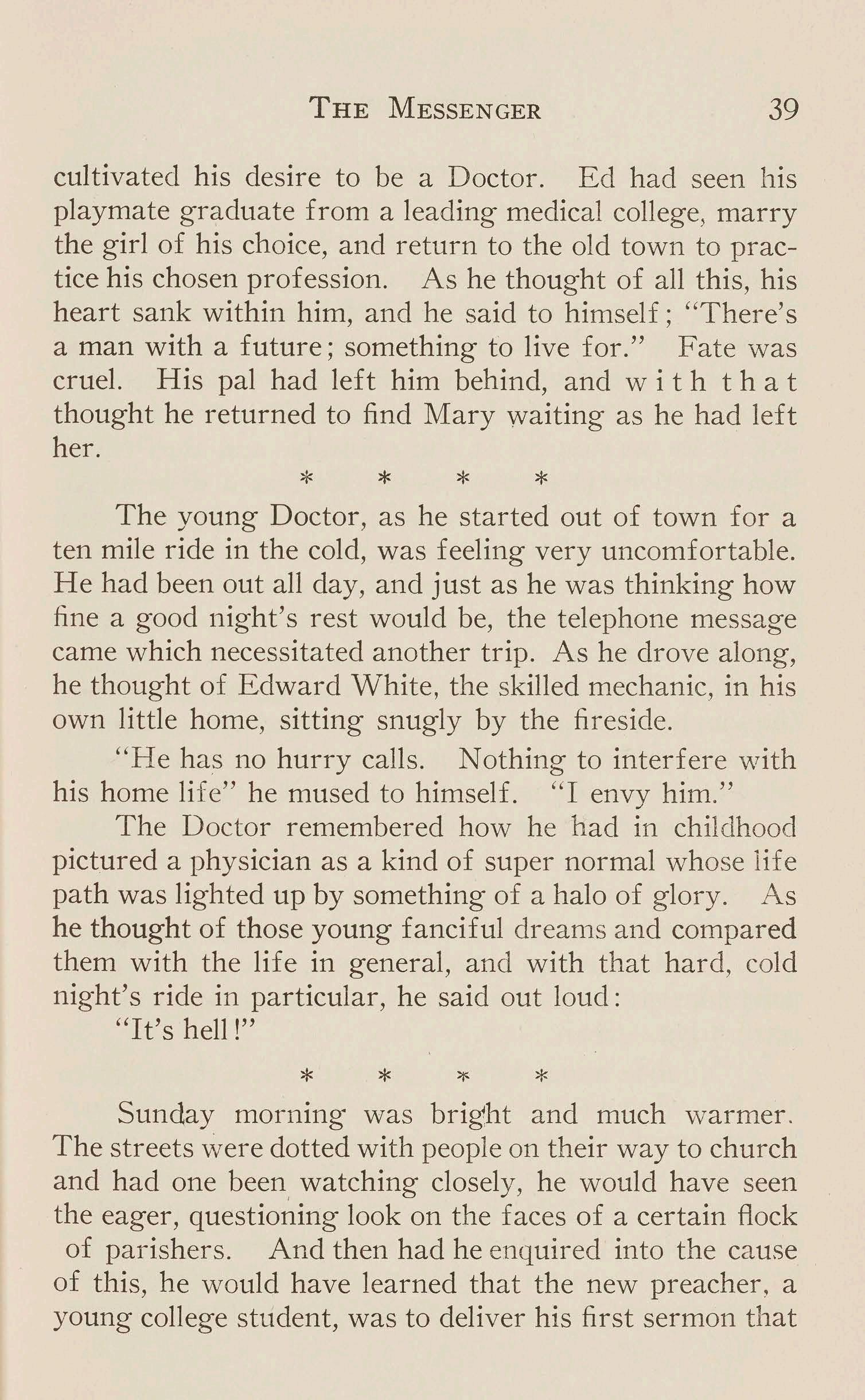
cultivated his desire to be a Doctor. Ed had seen his playmate graduate from a leading medical college , marry the girl of his choice, and return to the old town to practice his chosen profession. As he thought of all this, his heart sank within him, and he said to himself; " There's a man with a future; something to live for." Fate was cruel. His pal had left him behind, and with that thought he returned to find Mary waiting as he had left her.
The young Doctor, as he started out of town for a ten mile ride in the cold, was feeling very uncomfortable. He had been out all clay, and just as he was thinking how fine a good night's rest would be, the telephone message came which necessitated another trip. As he drove along, he thought of Edward White , the skilled mechanic , in his own little home, sitting snugly by the fireside.
"He has no hurry calls. Nothing to interfere w ith his home life" he mused to himself. "I envy him ."
The Doctor remembered how he had in chil dh ood pictured a physician as a kind of super normal wh os e li f e path was lighted up by something of a halo of glory . A s he thought of those young fanciful dreams and compared them with the life in general, and with that hard , cold night's ride in particular, he said out loud: "It's hell!"
Sunday morning was brigiht and much warmer. The streets were dotted with people on their way to church and had one been watching closely, he would have seen the eager, questio~ing look on the faces of a certain flock of parishers. And then had he enquired into the cause of this, he would have learned that the new preacher, a young college student, was to deliver his first sermon that

morning, for he had just recently accepted a call to that field.
At the appointed hour, services began, and the young preacher arose to read his text with a smile, for the house was full to overflowing. He had been a hard worker, fighting his way through college against what he felt at times to be overwhelming odds, financially, and otherwise. At times, when all his effo rts seemed to be of no avail, he would almost despair of the ministry, and then Satan awai t ing his opportunity, would sen d on a little attack of indigestion, and the struggling young preacher would declare the reward not commensurate to the price one had to pay. He had said to his wife one day: "No other man ever has to face the problems that a preacher has in his common lot."
But young pastor Riley was made of uncommon clay, and his philosophy was of the kind that permitted no turning back. So when this latest call had come he felt his burden lightened very perceptibly, and the smile on his face as he read, was the acknowledgment of a conscious reward.
It was an impressive service. His words flowing ea s i 1 y were eagerly listened to by the congregation. They fitted their own experiences so nicely. The young preacher held the audience enrapt as he led on to the climax of his sermon.
"No man has a right to disregard those things given him by divine Creator" he exclaimed. "Moreover," he continued, "It is the duty of man to cuitivate, not to bury, his God-given talents. And you," he seemed to point his finger straight at a figure leaning forward in his seat back in the rear of the auditorium-"yes, you," he emphasized, "were given your talents, whatever it be, v,:hether a gift for law, medicine, for writing, singing,
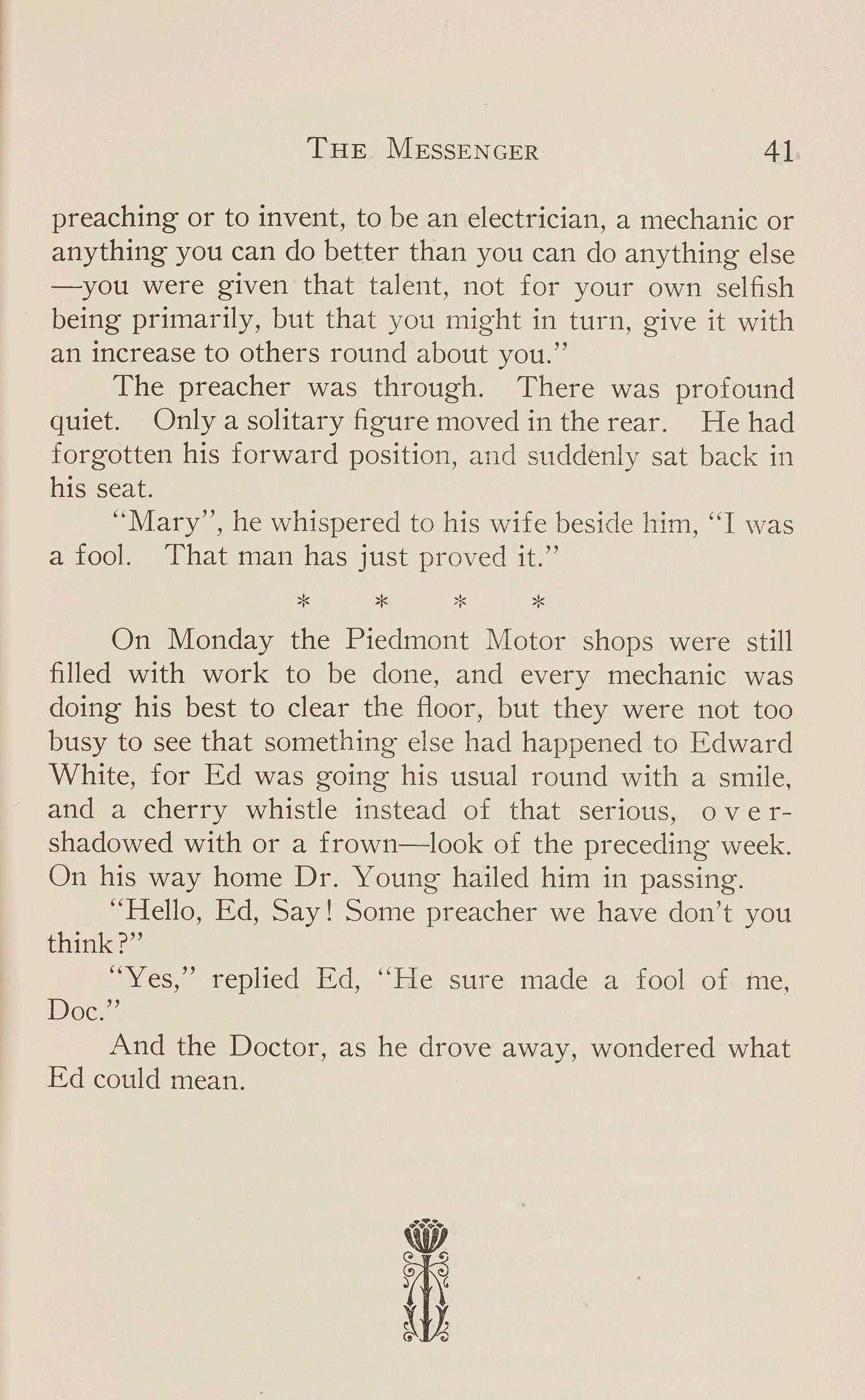
preaching or to invent, to be an electrician , a mechanic or anything you can do better than you can do anything else -you were given that talent, not for your own selfish being primarily, but that y ou might in turn , give it with an increase to others round about you."
The preacher was through. There was profound quiet. Only a solitary figure moved in the rear. He had forgotten his forward position , an d suddenly sat back in his seat.
"Mary", he whi spered t o hi s wif e be s id e him , " I ,va s a fool. That man has just pro v ed it."
* * * *
On Monday the Piedmont Motor shops were still filled with work to be done, and every mechanic was doing his best to clear the floor, but they were not too busy to see that something else had happened to Edward White, for Ed was going his usual round with a smile, and a cherry whistle instead of that serious , o v e rshadowed with or a frown-look of the preceding week. On his way home Dr. Young hailed him in passing.
"Hello, Ed, Say! Some preacher we have don't you think?"
"Yes," replied Ed, " He sure made a fool of me, Doc."
And the Doctor, as he drove away, wondered what Ed could mean.

tll:btDbidluinb
MARY L. PEPLE, '24
A naughty little whirlwind Dancing throitgh the trees, Prancing o'er the mountains, Floating on the breeze, A-whirling and a---twirling Round and round you go; Do you e'er get dizzy I would like to know'!
You whirl just like a mad man, Going round and round, Dancing now on tiptoe, Now floating up and down. A little mischief maker With your many whirls; When niaidens ritn and play, You tangle up their curls.
A tricky tittle whirlwind, Neither here nor there, Blowing up the clouds of dust Or sailing through the air. A re you never weary Of whirling to and fro'! Do you ever go to bed, To rest a day or so'! __ _
I know I would grow tired, Tiflith nothing else to do, But whirl around and twirl 'round And dance the whole day through. But pray, you little whirlwind, If whirl and twirl you must, Oh! please pick out a rainy day And don't stir 11pthe dust!-

@n r&ting ~i~ttr
JULIET WOODSON, '22
A sister is the most agreeable person in the world. I'm one myself, so I'm sure that I'm a good authority on the subject .
Almost the first time that I ever read the thirteenth chapter of First Corinthians, I mentally revised the last part of it. It may have been association of ideas-I had often been told that the mild-faced, black -hooded nuns whom I sometimes saw on the street were Sisters of Charity, and with a childish misunderstanding of the name, I always called them "Sisters are Charity." Later, when the memory of some brotherly insult rankled, I deliberately changed the verses; it was so comforting to have my feelings truthfully and poetically expressed in Bibical language. "A sister suffereth long and is kind ( that i s, nearly always) ; a sister envieth not ( I'm speaking from the viewpoint of a sisterless sister; brothers as a rule have nothing that is worth envying) ; a sister vaunteth not herself ( of course), is not puffed up-beareth all things, believeth all things, hopeth all things, endureth all things," ( and therein is my comparison best).
For years and years I protested against my lot. I spent all of my odd minutes in frantic attempts to kiss my elbow. Every time I saw a load of hay, every time the wishing combination of a red-haired woman and a snow-white horse passed me, and every time I saw the new moon over my left shoulder, I sent an earnest petition to the fairies that I might awake in the morning to find myself be-trousered, curl-less, and dirty-in every respect a Male.
My long-suffering as a sister consisted in being con-

sidered the originator of every unusual occurance in our house. Though nobody believed it, my reputation was a source of great distress to me. The affairs ( I can think of no better word) that were the most unpremeditated were inevitably those which resulted most lamentably. I can never forget the time that I suddenly and unintentionally inspired in Sutton a desire for a newer and a m ore original way of saying grace-Sutton is the baby, and he always "asks the blessing" at dinner. I shall always remember, too, father's face, as my little brother proffered his extraordinary request, "Father, may-uh--I . " may smg a-a---
" A hymn," I supplied tactfully.
"-Hymn," he continued hreathlessly, "Stead of saying grace, you know?"
Had there been just the family present , the memory of this unfortunate incident probably would have been soon effected; but Aunt Judith was our guest for the day. Aunt Judith lives in a perpetual state of deep disgust, because her chi Idren-should -be-seen-and-not-heard-theory has never been observed in our family. Her face expressed all shades of horror as Sutton began the very tuneful ditty,
" I see the steamer go 'round the bend, Good-bye, my lover, good -bye-"
Two of the immediate results are indelibly impressed on my memory; one, the swiftness with which my mother interupted the ambitious singer, the other, the serious talk my brother and I received after dinner from father. I have never understood the generous share of the blame thrust upon me . . I laid it all to the misfortune of sisterhood.
Then there was the time one of the boys-I don't remember which---just a few minutes before we sat down

to supper emptied the contents of the ipecac bot t 1 e into the cream pitcher. It wasn't my fault that my brothers had minds so receptive to casual suggestions; I myself never touched the bottle; and, as I afterward emphatically protested, I was at least three feet from the table when the deed was done. vVas I to be blamed simply because I had accidentlly ( I'm almost sure that it was accident) brought down the bottle from the medicine chest in the bathroom to the dining room? Doubtless I labored under the impression that it was vanilla(I've tried to remember the reason I had for thus seasoning the cream, but I find that I've forgotten it. I expect however, that it was a good one.) Truly a sister's fate is her Nemesis !
There trails sadly after these painful memories my recollection of the morning when mother brushed her teeth-, nay rather attempted to brush her teeth---with a tooth brush full of mucilage. I was the first one questioned though both of my brothers nobly supported me in my statement that the bottle had been knocked over by some careless hand-(This was the literal truth).
To certain extent---which means to a certain ageI suppose that all sisters believe all things. For a long time I listened with avid interest to the story beginning .. "Once a man was arrested for bottling cats up" which, as told by my younger brother, was a wonderous fable. But later I learned to listen with distrust to any report that started, "There was a dreadful collision down town this morning, sister," because I could somehow anticipate the ending-that Broad Street had run into First. It's amusing now to remember how bravely I always bore the atrocious puns thus lavishly handed to me and how I hoped each time that the story would turn out to be a real one.
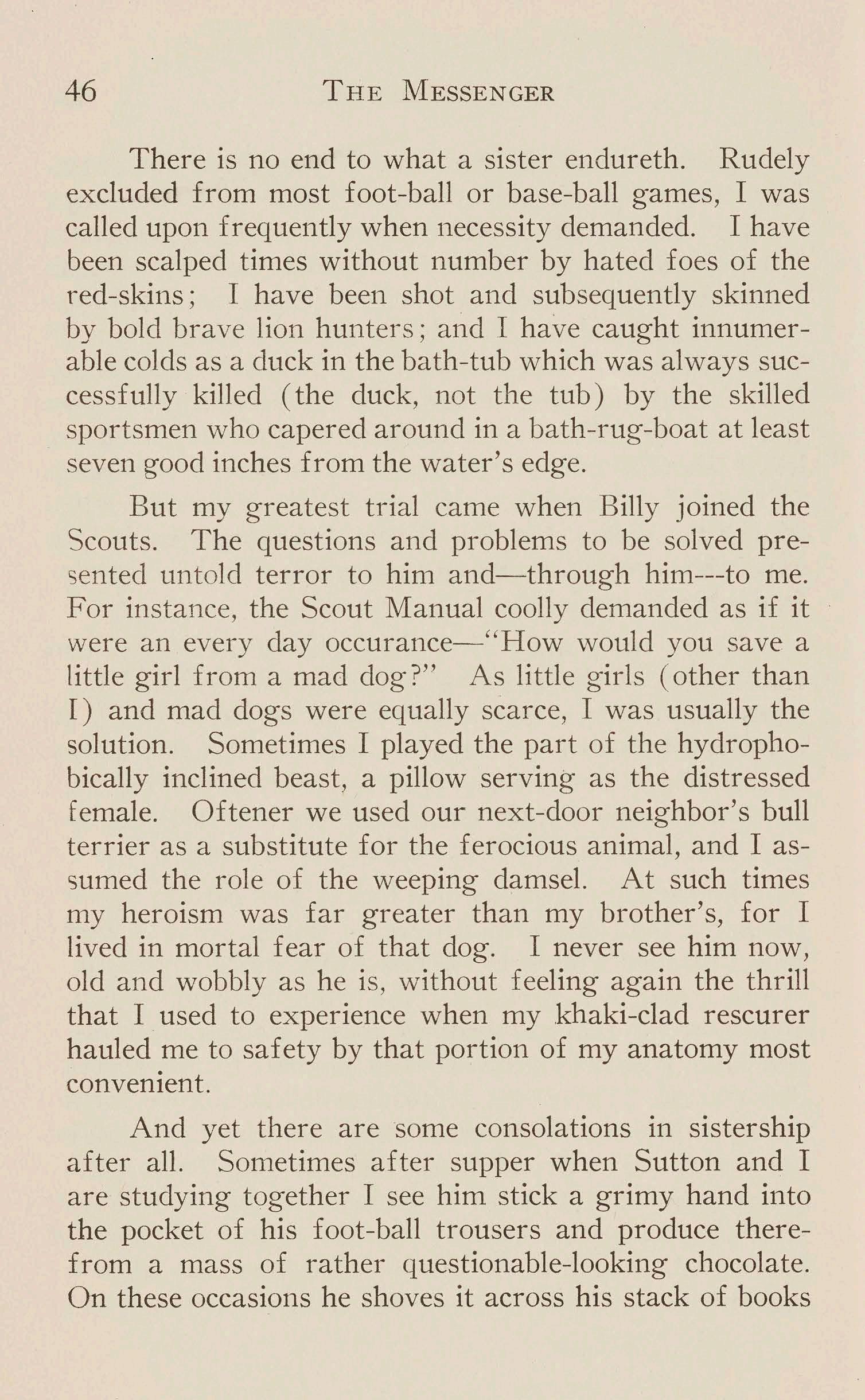
There is no end to what a sister endureth. Rudely excluded from most foot-ball or base-ball games, I was called upon frequently when necessity demanded. I have been scalped times without number by hated foes of the red-skins; I have been shot and subsequently skinned by bold brave lion hunters; and I have caught innumerable colds as a duck in the bath-tub which was always success£ully killed ( the duck, not the tub) by the skilled sportsmen who capered around in a bath-rug-boat at least seven good inches from the water's edge.
But my greatest trial came when Billy joined the Scouts. The questions and problems to be solved presented untold terror to him and-through him---to me. For instance, the Scout Manual coolly demanded as if it were an every day occurance-"How would you save a little girl from a mad dog?" As little girls ( other than r) and mad dogs were equally scarce, I was usually the solution. Sometimes I played the part of the hydrophobically inclined beast, a pillow serving as the distressed female. Oftener we used our next-door neighbor's bull terrier as a substitute for the ferocious animal, and I assumed the role of the weeping damsel. At such times my heroism was far greater than my brother's, for I lived in mortal fear of that dog. I never see him now, old and wobbly as he is, without feeling again the thrill that I used to experience when my khaki-clad rescurer hauled me to safety by that portion of my anatomy most convenient.
And yet there are some consolations in sistership after all. Sometimes after supper when Sutton and I are studying together I see him stick a grimy hand into the pocket of his foot-ball trousers and produce therefrom a mass of rather questionable-looking chocolate. On these occasions he shoves it across his stack of books

which usually disorders the library table, around the base of the reading lamp, and on to my pile of p a p e r s. "Sumpthin' for you," he mutters between his struggles with the conjugation of amo-"I bought some this evenin' an' I saved you half."
I always accept these small offerings gratefully, because they mean more than you would think at first. Then too, last winter, when I was quarantined with an ugly case of diphtheria, the postman brought me a little note from Billy, a tiny bit different from his usual collegefreshman letters, and with it a florist's long box into which his whole month's allowance must have gone. And I knew that both the letter and the box carried the same meaning as Sutton's chocolate drops.
At such times I feel that my early opinion of a sister's lot is no more than "seeing through a glass darkly" and that these occasional glimpses are really "face to face"

mbe((all <!&fmbt~ea
R. E. GARST,
'22
Where the ocean winds are blowing, where the Gulf Stream current' s flowing, Where the waves are dashing wild and free, Where the sea sheep wander aimless, and the waters blue are nameless, That's where a sailor's heart so longs to be.
With a rolling deck beneath him, with the calm that they bequeath him,
With the scuppers drenched in salty foam ,, With the waves oe'r ship's peak bursting, this the life for which he's thirsting, He's launched upon his oceanic home. Where the sea meets the horizon, and the wheeling stars emblazon
All the soft, blue-velvet firmament, Where the Southern Cross is swinging, and the flying fish are winging, That's where advent'rous hearts can find content.

mbe
Qtall<!&ftbt~ea
( Continued)
Where Mother Cary,s chickens follow, like some sea-born darting swallow
In the flying ship's rough, seething wake, Where the ocean storms are whining, and the sharks await their dining, H e,ll all these perils gladly undertake. What the port? No matter surely, trusting in the sea securely,
To bear him to some strange and foreign land; But his glimpses there are fleeting; on his course again he's beating,
To some stranger, greener, tropic strand.
Yet his days at sea are numbered, as his soul becomes1 encumbered
With old age that,s creeping stealthily; But his love and hope are strengthened, as his span ofi years is lengthened, For that brotherhood of men who sail the sea.

~bucationof 3fobn1.19ot
T. R. JEHNE,
'24
John Doe was a Southerner by birth. H e w a s reared in a state where the Civil War was of paramount interest to many. Little John absorbed these opinions thoroughly in his boyhood. His heart beat violently on Confederate Memorial day at the sight of the Stars and Bars. His blood raced when the band played Dixie and he often wished devoutly as a boy that the Northerners had been licked. In the graded school he read more than studied. Dickens was a great favorite; but probably Sir Walter Scott wa s his idol. This pleasant and uneventful ex istence con tinued until the young Doe reached his fifteenth birthday.
One day he heard on a phonograph a few Donizetti and Verdi arias. The lyrical Italian style opened new vistas to him and for days the melodies skipped through his mind. So enthusiastic was he, that he mentioned his experience to his school teacher, who was a Southern lady of the old school. She agreed with him heartily and advised him to hear some Bohemian Girl selections. He did so and was completely charmed. He decided that he would, on his own initiative and pocket, pursue a course in musical appreciation. He soon met Guonod's Faust and, as before, the teacher concurred. Then he bought a few Puccini records and learned to differentiate between the old and new schools of Italian opera. At this point young Doe received a jolt. His kindred soul, the teacher, had obvisously heard little about Puccini and furthermore cared to hear less. Young Doe undaunted continued hi s course and soon struck Wagner . J-1;owever, when he mentioned this idol to his teacher, the blank look
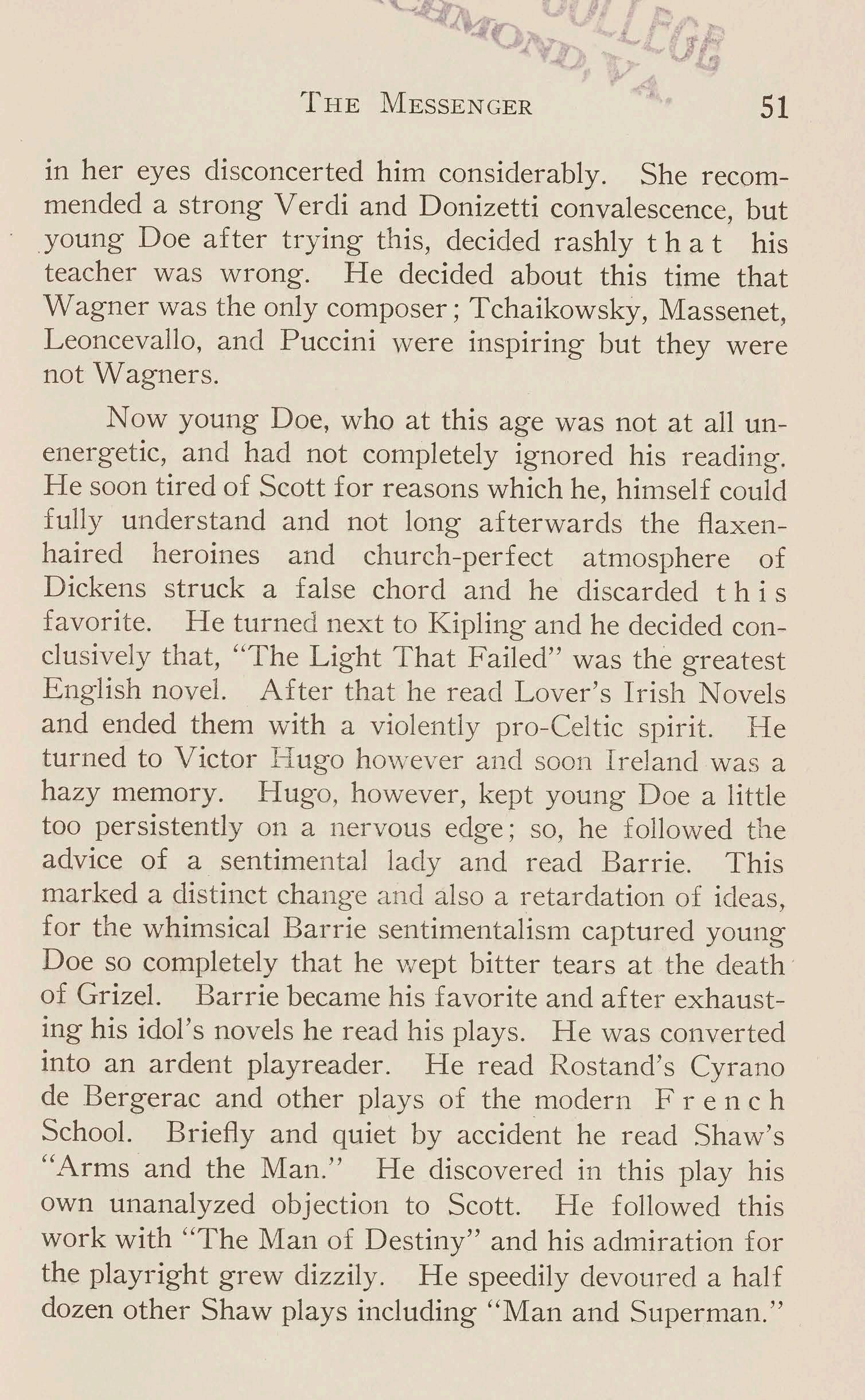
in her eyes disconcerted him considerably. She recommended a strong Verdi and Donizetti convalescence, but young Doe after trying this, decided rashly t h a t his teacher was wrong. He decided about this time that Wagner was the only composer; Tchaikowsky, Massenet, Leoncevallo, and Puccini were inspiring but they were not W agners.
Now young Doe, who at this age was not at all unenergetic, and had not completely ignored his reading. He soon tired of Scott for reasons which he, himself could fully understand and not long afterwards the flaxenhaired heroines and church-perfect atmosphere of Dickens struck a false chord and he discarded t h i s favorite. He turne d next to Kipling and he decided conclusively that, "The Light That Failed" was the greatest English novel. After that he read Lover's Irish Novels and ended them with a violently pro-Celtic spirit. He turned to Victor H ugo hO\;\,·ever and soon Ireland wa s a hazy memory. Hug o, however, kept young Doe a little too persistently on a nervous edge; so, he followed the advice of a sentimental lady and read Barrie. This marked a distinct change and also a retardation of ideas, for the whimsical Barrie sentimentalism captured young Doe so completely that he wept bitter tears at the death of Grizel. Barrie became his favorite and after exhausting his idol's novels he read his plays. He was converted into an ardent playreader. He read Rostand's Cyrano de Bergerac and other plays of the modern French School. Briefly and quiet by accident he read Shaw's "Arms and the Man." He discovered in this play his own unanalyzed objection to Scott. He followed this work with "The Man of Destiny" and his admiration for the playright grew dizzily. He speedily devoured a half dozen other Shaw plays including "Man and Superman."

He found that Shaw the Philosopher attracted him quite as much as Shaw the satirist. Although he subsequently read Lord Dunsany, Ibsen, Masefield, Synge, and the American playwright, O'Neil, he never outgrew his ad-. miration for the Shavian philosophy and the Shavian touch.
A fly was not missing in the proverbial ointment. Young Doe, as is the way of the average human being, felt the impulse to unburden his enthusiasms to some receptive soul. To his genuine surprise and disappointment he found that in the Southern city, where he lived, there was practically no person, of accessibility, who cared to discuss with him these great subjects. He felt at first that possibly he was considered a negligible conversationalist and that it was only disregard which caused this hollow silence. But when a college senior asked in ;i,-1 off-hand fashion who this fellow Shaw was anyway, he began seriously to consider a subject which at first seemed impossible. He found that Mathew Arnold and Macauley were the principal brain foods among many Southern thinkers. He observed that Southerners in one state pinned one particular novelist's name over their doorways and he guessed that these loyal acclaimers would either be severely shaken or bored by the novelist's books. He went to an opera in a Southern city and found the seats half-filled. He went to a high-priced movie house and heard jazz applauded while classics went unheard. He saw a Southern audience at a concert clap in the pause of a motif of an opera aria, and he observed the smile that stole across the face of the accompanist.
John Doe naturally feels a sentimental affection for the South and these blunders truly pain him. But what brings pain to Doe merely excites a scornful laugh in an outsider and is the inspiration for caustic and cutting magazine articles by Northern editors.

@n;Gting ",i,ector~be ~rotector"
VIRGINIA MONCURE, '22
Our family seems destined to live in a neighborhood inhabited by wives, whose respective husbands are in a chronic state of being "off on business," which invariably results in my reluctant assumption of the bitter roll of "Hector the Protector." A cousin, seeing the hard lot that was mine, invented this lofty title. A ''Hector the Protector" is one, who serving all home ties, goes into the house of his neighbor, with a sad and downcast countenance, to protect a wife who trembles at the departure of her lord, and awaits "the Protector" with open arms.
I once suggested, in trying to cover my anguish with glory, that the name, "Hector the Protector", smacked somewhat of some old Roman hero. It didn't take a hard hearted brother long to enlighten me by stating that he for one, thought it sounded as though I might be a watchdog, I keep my theories to myself now.
I have laid no claim to any great amount of valor that these spouseless women should thus see me. In their distorted minds, I seem to have taken on the strength and magnitude of Hercules. I am short, so much so, that when I sit on a chair the least bit high, my feet dangle childishly in midair, and occurances which mortify me well nigh to death. Imagine any one impersonating Hercules, being so short and childish as to allow her feet to act in such an unseemly manner!
When I hear Mother, answering the telephone, say, "I'll send little Virginia right over," I know that the inevitable Adamless Eve is at the other end of the line. Raving against my fate, I look around upon the family, disposed about the living room in comfortable, imper-

turbable attitudes. Why should I be the one to abandon the house life at the S. 0. S. call of a neighbor, when there lounging luxuriously in an arm-chair, is my perfectly sound brother, able to cope with numberless burglars? I have come to the conclusion that I am of a grim and forbidding visage which has a disturbing influence upon all burglars unlucky enough to encounter me in mortal combat.
I endeavor to convince each member of the family that he, or she, alone is admirably fitted to impersonate "Hcetor the Protector ;"but, being imune to flattery, they, each and evey one, "give me the cold shoulder," .so to speak. With ;an "I-who-am-about-to-die,-salute-thee" air, I bid them good-night. Father, full of mock sympathy, conducts me on his arm to the door, which he opens with a grand flourish, and in a deep, solumn bass says, "O, great Hector the Protector, mayst thou return with the scalps of many a burglar adorning thy good belt;" and he bows low as I pass out. In silence I go out into my neighbor's door and, with a farewell wave to Father, and his "good night, Hector!" I am in the house of my neighbor-and I am homesick.
Contemplating murder as the only means of muffling the snores of my charge, I fall asleep. Suddenly I hear a barely audible creak and see a man wearing a mask. I instantly recognize my enemy, the long-awaited burglar, for whose reception I am responsible. Never h a v i n g seen one before, I rather pride myself upon recognizing him so swiftly-of course I couldn't have done so if he hadn't worn a mask. With one ,leap I am upon him; I become "Hector the Protector" in action. Endowed with superhuman strength I grasp him gently but firmly by the throat and choke him. My grim, forbiding visage evidently has an overpowering influence upon him, for he

does not pretend to resist. I hurl him to the floor , and, taking my stand upon his prone form in the "Sic-SemperTyrannis" attitude , I sing a psalm of joy. The Adamless Eve awakes; her hair immediately stands on end, the plait poised in the air giving her a decidedly wild appearance . She begins to shout, "Off with hi s head!" for all the world like the queen of Hearts in Alice in Wonderlandand then the alarm clock goes off and I awake. At any rate, I have had the satisfaction of knowing what I might do to a burglar.
When I am old and gray, Mother, in her generosity, will continue to send me forth ofter announcing , " I'll send little Virginia right over," and away I will hobble to impersonate "Hector the Protector."
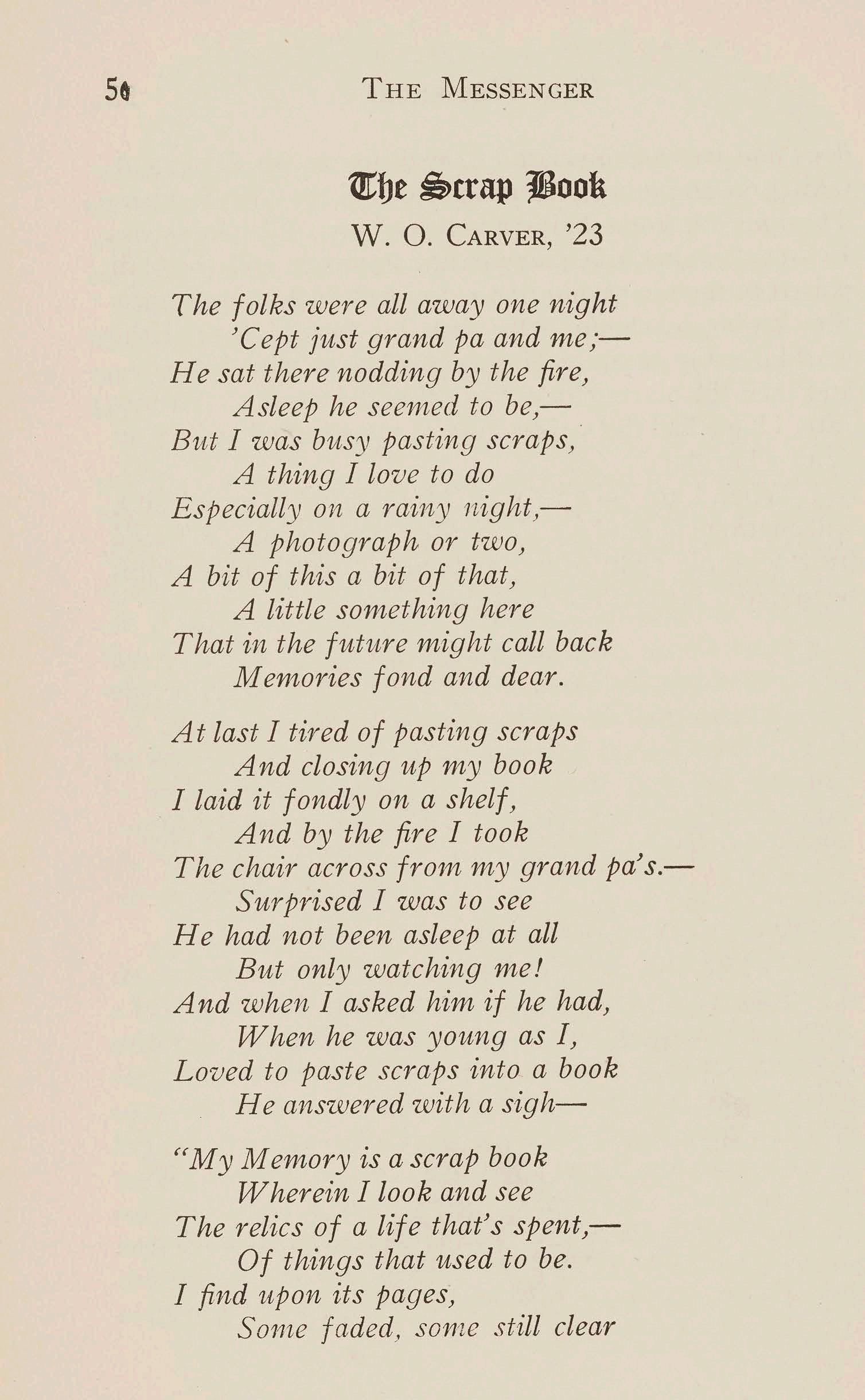
~be ~crap r,iook
w. 0. CARVER, '23
The folks were all away one night 'C ept just grand pa and me;H e sat there nodding by the fire, Asleep he seemed to be,-
But I was busy pasting scraps, · A thing I love to do
Especially on a rainy night,A photograph or two, A bit of this a bit of that, A little something here
That in the future might call back Memories f and and dear.
At last I tired of pasting scraps And closing up my book I laid it fondly on a shelf, And by the fire I took
The chair across from my grand pa's.-
Surprised I was to see He had not been asleep at all But only watching me!
And when I asked him if he had, When he was young as I, Loved to paste scraps into a book He answered with a sigh-
"My Memory is a scrap book
Wherein I look and see
The relics of a life that's spent,Of things that used to be. I find upon its pages, Some faded, some still clear

The joys and griefs that I once knew, And every doubt and fear. I see the faces of old friends That are not here today, And look once more upon the scenes I. passed along the way.
"I read there ei 1ery noble thoitght, Ambitions that I had;! see there everything J'7.•edone, The good deeds and the bad. I see there every hope fulfilled Or lost along the way. And there I find the record kept Of each and every day That I have used or misapplied From those of early youth V p unto the present time All writ in plainest truth.
"And as I gaze into my book I often wish that I Had pasted difjerent scraps upon Some pages, and I try By every means I can contrive To bolt or tear them out! Some pages I would like to change For when I think about The pictures beautiful that I Might in my book have had Instead of those I pasted there It makes my spirit sad!
"Now you, my boy, will have some day A book of memories too;Y on're pasting scraps into it now B) 1 e7.Jerything you do.

Each year that passes is a page!The scraps,---your thoughts, your deeds, Your fancies, and the friendships farmed, Your sorrows, cares, and needs!
Some day when you are old as I You'll sit as I do here And wonder backward through your life And read it year by year!
{(If you would have a book that you Will love and count a friend,Of scraps and pictures beautiful, With which you'll love to spend The evening when ' J'OU,reold and grey Like your grand pa,-why then Just build a life that's beautiful, Remembering that when You think a thought, or dream a dream, Or farm a friends hip true You paste a scrap into your book;! give this thought to you))
Now I have often thought about The things that grand pa said. I've turned theni over oft in mind, And though he's long been dead Yet can I sit before the fire And feel his presence there Across from me as on that night He sat there in his chair, And hear him tell again to me The best a man can do Is build a life that's beautiful With tender things and true. I pass this thought along to you, You're pasting scraps by all you do!-
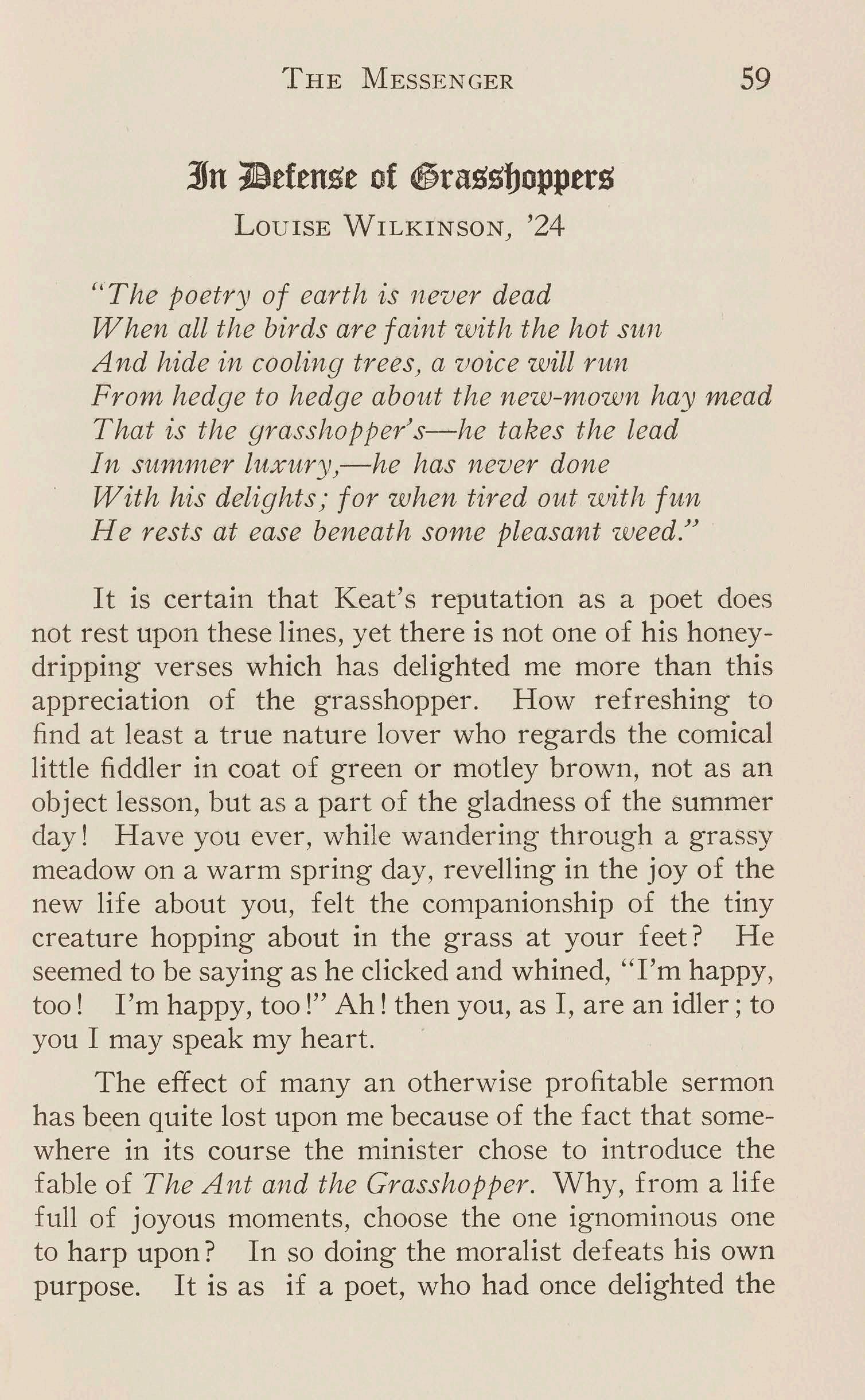
3JnjJ9efen~e of ©ra~~bopper~
LOUISE WILKINSON, '24
"The poetry of earth is never dead
When all the birds are faint with the hot sun
And hide in cooling trees, a 'voice will run
From hedge to hedge about the new -mown hay mead That is the grasshopper's-he takes the lead In summer luxury,-he has never done With his delights; for when tired out with fun He rests at ease beneath some pleasant weed."
It is certain that Keat's reputation as a poet does not rest upon these lines, yet there is not one of his honeydripping verses which has delighted me more than this appreciation of the grasshopper. How refreshing to find at least a true nature lover who regards the comical little fiddler in coat of green or motley brown, not as an object lesson, but as a part of the gladness of the summer day! Have you ever, while wandering through a grassy meadow on a warm spring day, revelling in the joy of the new life about you, felt the companionship of the tiny creature hopping about in the grass at your feet? He seemed to be saying as he clicked and whined, "I'm happy, too! I'm happy, too!" Ah! then you, as I, are an idler; to you I may speak my heart.
The effect of many an otherwise profitable sermon has been quite lost upon me because of the fact that somewhere in its course the minister chose to introduce the fable of The Ant and the Grasshopper. Why, from a life full of joyous moments, choose the one ignominous one to harp upon? In so doing the moralist defeats his own purpose. It is as if a poet, who had once delighted the

world with his songs, were held up to ridicule as he entered the door of the Poor House. While the ant was selfishly hoarding her store of winter food, the grasshopper was giving lavishly of his wealth of happiness to all who passed his way. Which is to be abhorred, the minstrel of the sunny fields who had made no preparations for winter, or his thrifty neighbor who, in smug self-righteousness, turned him from her door? Moreover, ethical consideration aside, I much prefer a dozen grasshoppers in my garden to one ant in my sugar bowl.
I greatly fear, nevertheless, that, so far as public opinion and material possession go, the grasshoppers get the worst of it. The world, though rewarding with prodigal hand those who minister to it materially, is slow to recognize its indebtedness to those frequenters of the "primrose path of dalliance" who lead it away from the dusty highway to the sweet, dewy grass of the fields . But what does he care for rewards, this minister of joy! He has the love of flowers and winds; he has the wisdom of the aged oak; he has the luxury of the summer time. And if with the summer he must pass, it matter not, for 'tis living he loves, not life.
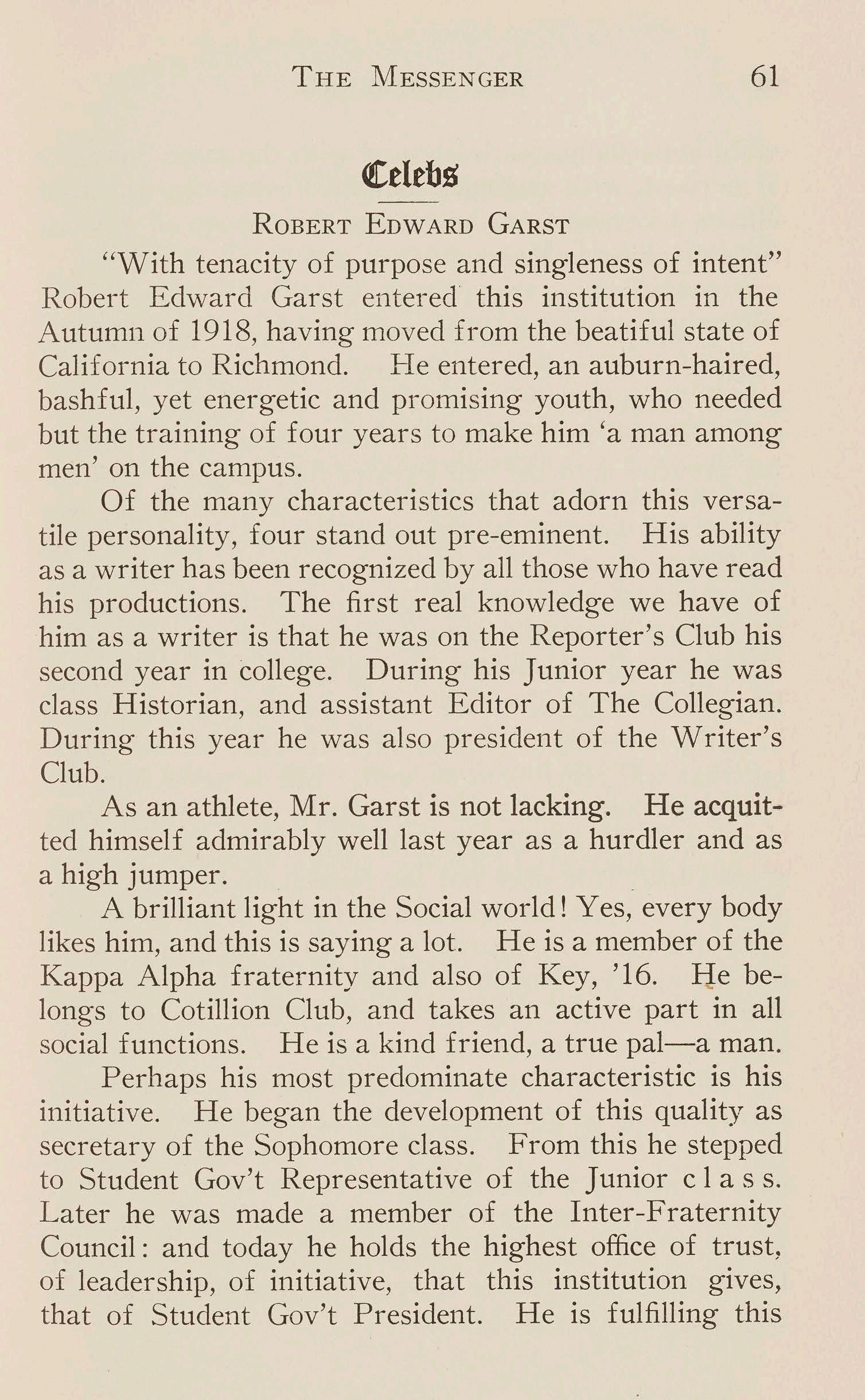
ROBERT Enw ARD GARST
"With tenacity of purpose and singleness of intent" Robert Edward Garst entered this institution in the Autumn of 1918, having moved from the beatiful state of California to Richmond. He entered, an auburn-haired, bashful, yet energetic and promising youth, who needed but the training of four years to make him 'a man among men' on the campus.
Of the many characteristics that adorn this versatile personality, four stand out pre-eminent. His ability as a writer has been recognized by all those who have read his productions. The first real knowledge we have of him as a writer is that he was on the Reporter's Club his second year in college. During his Junior year he was class Historian, and assistant Editor of The Collegian. During this year he was also president of the Writer's Club.
As an athlete, Mr. Garst is not lacking. He acquitted himself admirably well last year as a hurdler and as a high jumper.
A brilliant light in the Social world l Yes, every body likes him, and this is saying a lot. He is a member of the Kappa Alpha fraternity and also of Key, '16. Be belongs to Cotillion Club, and takes an active part in all social functions. He is a kind friend, a true pal-a man.
Perhaps his most predominate characteristic is his initiative. He began the development of this quality as secretary of the Sophomore class. From this he stepped to Student Gov't Representative of the Junior c 1ass. Later he was made a member of the Inter-Fraternity Council: and today he holds the highest office of trust~ of leadership, of initiative, that this institution gives, that of Student Gov't President. He is fulfilling this
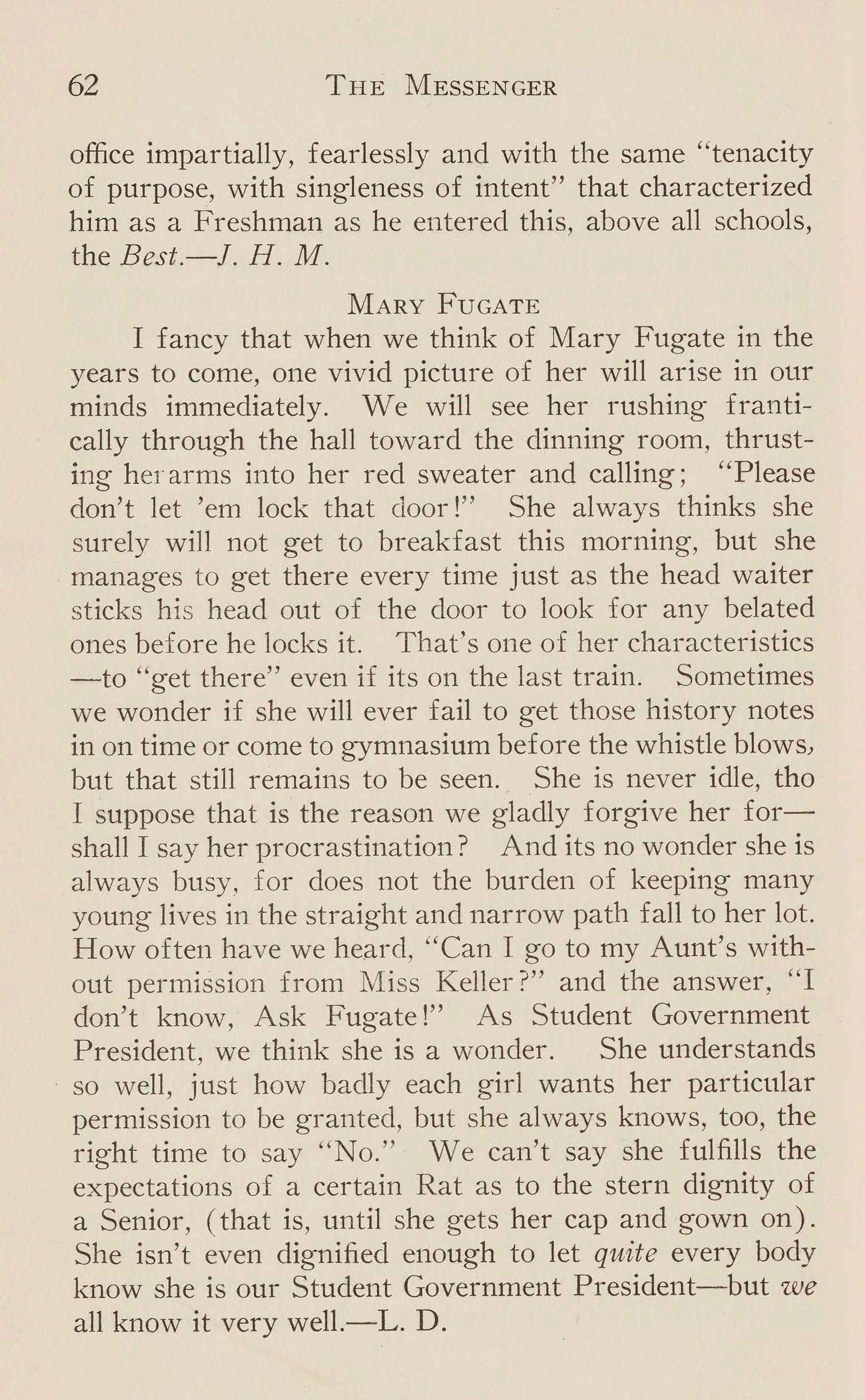
office impartially, fearlessly and with the same "tenacity of purpose, with singleness of intent" that characterized him as a Freshman as he entered this, above all schoo ls, the Best.-J. H. M.
MARY FUGATE
I fancy that when we think of Mary Fugate in the years to come, one vivid picture of her will arise in our minds immediately. We will see her rushing frantically through the hall toward the dinning room, thrusting her arms into her red sweater and calling; "Please don't let 'em lock that door l" She always thinks she surely will not get to breakfast this morning, but she manages to get there every time just as the head waiter sticks hi s head out of the door to look for any belated ones before he locks it. That's one of her characteristics -to "get there" even if its on the last train. Sometimes we wonder if she will ever fail to get those history notes in on time or come to gymnasium before the whistle blows, but that still remains to be seen. She is never idle, tho I suppose that is the reason we gladly forgive her forshall I say her procrastination? And its no wonder she is always busy, for does not the burden of keeping many young lives in the straight and narrow path fall to her lot. How often have we heard, "Can I go to my Aunt's without permission from Miss Keller?" and the answer, "I don't know, Ask Fugate l" As Student Government President, we think she is a wonder. She understands so well, just how badly each girl wants her particular permission to be granted, but she always knows, too, the right time to say "No." We can't say she fulfills the expectations of a certain Rat as to the stern dignity of a Senior, ( that is, until she gets her cap and gown on). She isn't even dignified enough to let quite every body know she is our Student Government President-but we all know it very well.-L. D.
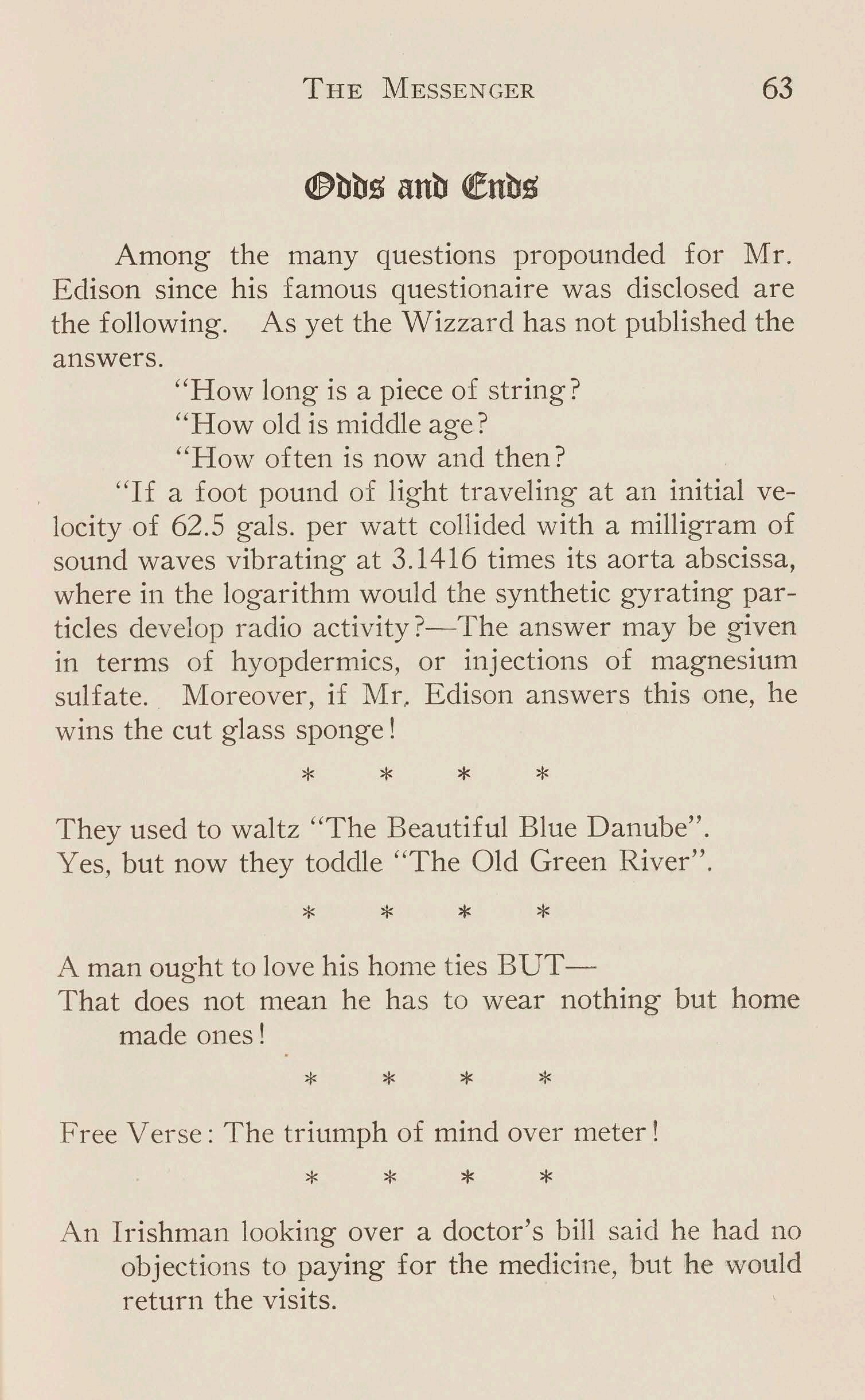
Among the many questions propounded for Mr. Edison since his famous questionaire was disclosed are the following. As yet the Wizzard has not published the answers.
"How long is a piece of string?
"How old is middle age?
"How of ten is now and then?
"If a foot pound of light traveling at an initial velocity of 62.5 gals. per watt collided with a milligram of sound waves vibrating at 3.1416 times its aorta abscissa, where in the logarithm would the synthetic gyrating particles develop radio activity ?-The answer may be given in terms of hyopdermics, or injections of magnesium sulfate. Moreover, if Mr, Edison answers this one, he wins the cut glass sponge!
* * * *
They used to waltz "The Beautiful Blue Danube". Yes, but now they toddle "The Old Green River". * * * *
A man ought to love his home ties BUTThat does not mean he has to wear nothing but home made ones!
* * * *
Free Verse: The triumph of mind over meter! * * * *
An Irishman looking over a doctor's bill said he had no objections to paying for the medicine, but he would return the visits.

"Hello, Flanders, how's your cold?" "Very obstinate."
"How's your wife?" "About the same." * * * *
Don't believe that all the bad that is said about others is true; and don't believe that all the good said about you is true, either. * * * *
A physician says that goat's milk is better than cow's milk for children and that there ought to be a goat in every home. Well isn't there? * * * *
The negro clergyman protested having to pay his water bill, saying that the Lord made air and water free. "Yes", answered the collector. "We do not charge for the water itself, but only for pumping it to you."
The next Sunday morning the old darky rose before his congregation and said: "Bretheren, befo' takin' the c'llection, I wants to say that salvation am free, but I'se charging you for pumping it to yuh !" * * * *
A man may be weak in the upper story and still be popular-if he is strong in the cellar.
A woman's idea of Hades: "Nobody loves me and my clothes don't fit!"

What's in a name ?-"Aldebonontiphoscophornio, Where left you Chorononhotonthologos ?"
* * *
Written English seemed somewhat inadequate when we attempted lately to write a statement using only one word for these three homonyms, rein, reign and rain . Perhaps you can help us. "There are three---(plural) in the English Language." Write the spoken word in the blank space! * * * *
Miles vary. Our mile is 1760 yards. mile is the longest, 12,182 yards. the Chinese, about 600 yards.
The Norwegian The shortest is
In ten years the iWesscnger has published, besides many articles not named here: 330 poems, 303 short stories and 252 essays.

Bargains In U.S. Army Goods
Army Shoes, Boots, Leggins, Riding Breeches, Socks, Underwear, Overcoats, Raincoats, Shirts etc., Tents, Cots, Blankets and general Camping Equipment. Stop by one of our Stores on your next trip down town and look over some of our surprisingly low-priced bargains. A
